

Tao Te Ching
Leonardo da Vinci
Humanism Lineage
Broadly defined, almost all of the people in the biographies here could be categorized as “humanist.” The heart of this definition emphasizes the value and basic goodness of human beings, freedom and progress, critical thinking instead of belief. It promotes a philosophical and political stress on making the world a better place for all sentient beings and the planet as a whole. This list begins with the Renaissance humanists who emphasized the study of classic, Greek wisdom, the “humanities,” reason, and moral philosophy. This movement began in Italy, spread across Europe, and included scientists, politicians, philosophers, even popes. It developed a non-theistic foundation which separated the Renaissance from the Reformation. Thomas Paine, one of America’s founding fathers called this the "religion of humanity" and his book, The Age of Reason, helped bring this point of view into the more modern world. George Eliot and Harriet Martineau became important 19th century influences and in more modern times, the first Humanist Manifesto was proclaimed in 1933 defining humanism in terms of reason, justice, and an allegiance to science over religion. “Secular Buddhism,” called the “fastest growing religion in the world,” may represent this tradition’s thrust into the future.
People (139)
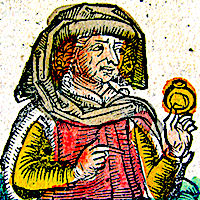
Ovid oʊvɪd (Publius Ovidius Naso)
43 BCE – 18 CE
Great poet and major influence on the Renaissance, Humanism, and world literature
Roman poet, inspiration for Renaissance humanism, consummate love elegist, and a tremendous influence on both Western literature and art; Ovid was staggeringly popular during his own time, during the Middle Ages, during the Renaissance, and still in our own time today. Fashioning himself as a love doctor, he wrote a 3-volume treatise called The Art of Love complete with instructional images and poetry about oral sex pleasure. It begins with teaching men how to best find a lover, seduce them, and later hide affairs. It continues with advice for women on how to avoid the traps and deceptions he has taught men. This also became immensely popular but his popularity didn’t serve him well politically. Emperor Augustus exiled him to a remote, harsh location where his friends avoided him and he remained until he died 9 years later.
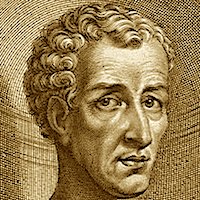
Lucian of Samosata
125 – 180 CE
Monumental influence on western literature.
Syrian satirist, Roman rhetorician, Egyptian official, traveling teacher, and prolific, popular author; Lucian used sarcasm, irony, and humor to make fun of philosophical schools, superstition, religious practices, plutocracy, and paranormal beliefs. His writings include the first science fiction, A True Story (complete with journeys to the moon and to Venus, extraterrestrials, artificial life, and interplanetary warfare), the oldest known version of "The Sorcerer's Apprentice,” and his invention of the comic dialogue genre in his parodies on the Platonic dialogue. Depicted in a Byzantine encyclopedia as burning in hell because of his criticism of Christianity, he became a monumental influence on western literature. His books inspired Shakespeare's Timon of Athens and Hamlet, Swift's Gulliver's Travels, Erasmus's Encomium Moriae, Thomas More's Utopia as well as Botticelli's paintings. His influence extends through the ages by way of Voltaire, Diderot, Cyrano de Bergerac, Jules Verne, David Hume, Henry Fielding, and many more.
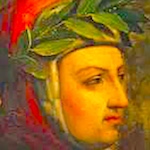
Petrarch
1304 – 1374 CE
The “Father of Humanism,” troubadour of romantic love, lover of nature, “Virgil born again,” the most famous unrequited lover, and most important poet of his age; Petrarch inspired an interest in ancient history and as “the first tourist” discovered and translated many old manuscripts including Cicero’s letters that sparked the 14th-century Renaissance. Holding the sense over the words, he challenged orthodoxy and invented new Latin terms to describe Greek philosophy, developed the concept of an historical “Dark Age” after the fall of Rome, a need for a cultural revival, inspired the political, military, and religious leaders of his time to ground their lives in classical values and contemplation. and his sonnets became a model for lyrical poetry through modern times.
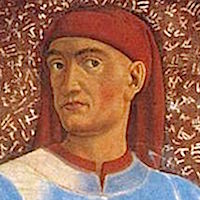
Giovanni Boccaccio dʒoˈvanni bokˈkattʃo
1313 – 1375 CE
Close student, friend and collaborator with the “Father of the Renaissance,” Petrarch; Boccaccio became a popular poet/writer, “the first Greek humanist in Western Europe,” and promoted the ancient literature, philosophy, and history which set the stage for the Renaissance. His book on classical mythology became a key reference for 400+ years and challenged Christian belief that only the Bible was relevant, that there was only harm in “pagan” writings. In an early nod to feminist proposition, he wrote the first collection devoted to the biographies of famous women. Living through a tumultuous time of political intrigue, the executions of his friends, bitter poverty and bad health; he resisted many of the era’s superstitious and setting-sun forces; translated works by Homer, Euripides, and Aristotle; and helped launch one of history’s most influential shifts, the Renaissance.
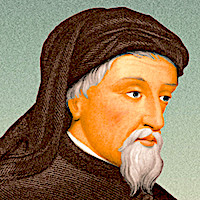
Geoffrey Chaucer
1343 – 1400 CE
“Father of English literature”
Scientist, philosopher, diplomat, “Father of English literature,” and greatest Middle Ages English poet; Chaucer transitioned literature in French and Latin to an English for the English-speaking. Also a page, bureaucrat, soldier, messenger, administrator, and valet; he portrayed and spoke for the common person. This support for the populace however created a backlash from the monarchy and he was fined and imprisoned. Claimed by the Protestant movement as an early forefather, he tried to separate religion from superstition, was rumored to have beaten up a Franciscan Friar on a public street, and supported religious reform.
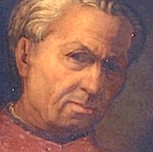
Poggio Bracciolini
1380 – 1459 CE
Gladiatorial orator, personal secretary to 7 popes including the “Antipope” John XXIII, scholar, early humanist, prolific and for his time astonishing writer; Poggio helped develop the Italic font, invented the Roman font still popular today, and helped spark a rebirth of old wisdom that led Europe out of the Dark Ages, into science and our modern age. Profuse traveller, friend to the great scholars of his time as well as politicians like Pope Nicolas V, Cosimo and Lorenzo de' Medici who supported his efforts to find and preserve ancient Greek and Roman manuscripts; he discovered and copied a large number of important classical works forgotten and decaying in old libraries including De Rerum Natura, Lucretius’ only surviving book.
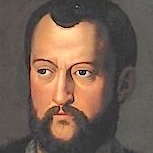
Cosimo de’ Medici
1389 – 1464 CE
Inheritor of a huge fortune; wandering bibliophile; owner of banks, businesses, farms, and factories; friend to cardinals and sultans alike; founder and “first among equals” leader of a political dynasty that helped begin and extend the Renaissance; Cosimo de’ Medici did what the rich need to do today: use their wealth to benefit the world instead of only themselves. In his own and other countries he strongly supported public works, charities, and libraries; funded the work of poets, artists, scholars and philosophers; established an academy for the study of Plato and launched the Renaissance revolution of philosophy over the Middle Ages’ scholasticism - the sense over the words.
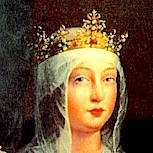
Isabella I (of Castile)
1445 – 1504 CE
Wise Renaissance queen, patron of the arts, strong centralizing leader, Christopher Columbus’ financier known for her fairness and justice, and the first woman depicted on both a US coin and US postal stamp; Isabella - after helping to reunify Spain, reorganized the government, dramatically brought down the debt and the crime rate to the lowest it had been in many years, and established Spain as the first global power dominating Europe for more than 100 years. Although she persecuted Jews and Muslims, her life was scrutinized by the Catholic Church for 500 years before being sainted in 1974 with the title, "Servant of God.”
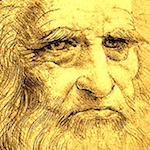
Leonardo da Vinci
1452 – 1519 CE
One of the most talented people to have ever lived, original “Renaissance Man,” father of paleontology, ichnology, and architecture; with a passionate curiosity and interest in everything, da Vinci’s genius extended to science, music, mathematics, engineering, painting, architecture, sculpture, anatomy, geology, astronomy, botany, history, and cartography. Remarkable inventor, mystical pantheist, vegetarian, savior of caged birds, and exemplar of journey-without-goal, he wrote over 5000 pages but didn’t finish one book, many of his commissions, even some of his greatest paintings, and claimed that one of the his most famous paintings, The Mona Lisa was incomplete.

Erasmus (Desiderius Roterodamus)
1466 – 1536 CE
"Greatest scholar of the northern Renaissance"
"Prince of the Humanists,” famous translator, globalist and true citizen of the world; Erasmus emphasized a middle way approach between Luther and the Pope during the Reformation angering both sides. Not many know much about about him but his legacy is well known in the sayings and phrases he compiled and popularized. Some of his sayings like “The grass is always greener on the other side of the fence,” “God helps those who help themselves,” “Don’t put the cart before the horse,” “Leave no stone unturned,” “In the land of the blind the one-eyed man is king,” “No sooner said then done,” “Between a rock and a hard place,” “Call a spade a spade,” “Women – can’t live with them or without them,” “Like father like son,” “To look a gift horse in the mouth,” “To break the ice,” “To cut to the quick,” “One step at a time,” “A necessary evil,” “What’s done cannot be undone,” “Up to his eyeballs,” “To sleep on it,” have not only entered into common conversation; but also, become a powerful influence on Western culture.
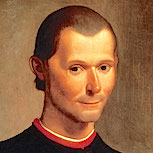
Machiavelli (Niccolò Machiavelli)
1469 – 1527 CE
Unjustly vilified by history as well as his contemporaries, Machiavelli is known as the “founder of modern political science,” a major influence on the USA’s founding fathers, and the development of modern science. Personified with unscrupulous, immoral political activity, devious deceit, realpolitik and evil tyrants; many of history’s true heroes like Spinoza, Rousseau, Francis Bacon, John Milton, Montaigne, and Descartes secretly considered him an inspiration for the Enlightenment that followed 200 years later. Rousseau thought his book The Prince - far from condoning - was not written as advice to ruler who already understood these principles but rather satirically exposed their corrupt methods to the common people. Not the source for the quote, “The end justifies the means,” Benjamin Franklin and Thomas Jefferson considered him a “partisan of liberty” and John Adams seriously studied his philosophy and used it to clarify the Constitution’s idea of mixed government.
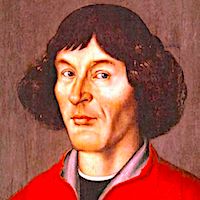
Copernicus, Nicolaus
1473 – 1543 CE
Creator of one of history's greatest revolutions
From our point of view, such a simple and obvious proposition—that the Earth rotates around the Sun. At his time and place in history, however, Copernicus created one of the most far-reaching revolutions of understanding in the history of the world. Mathematician, astronomer, physician, translator, diplomat, economist, polyglot and polymath; his celestial theory threatened the powerful Catholic Church so much it was considered an atheistic blasphemy and because Galileo agreed with it, he was incarcerated for the last nine years of his life. An early humanist, he also developed an important economic concept and theory of money, translated poems from Greek to Latin, and even became an effective and influential government official.

Michelangelo
1475 – 1564 CE
One of the greatest artists of all time and complete “Renaissance man,” much of Michelangelo’s painting, sculpture, and architecture stands with the world’s most famous. Also a poet and engineer and unlike many famous artists, his genius was recognized during his lifetime – he was the first Western artist with a biography published while still alive. His statues of David and the Pietà are the most famous sculptures in the west, his painting of the Sistine Chapel ceiling is the “cornerstone of Renaissance art,” his architectural innovations were revolutionary and St. Peter’s Basilica is regarded as the greatest building of its age and remains one of the two largest churches in the world.
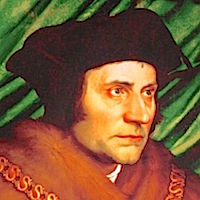
Thomas More
1478 – 1535 CE
Thomas Moore (1478 – 1535)
Christian humanist, Henry VIII confidant, ascetic, Lord High Chancellor of England, brave psychological explorer; Moore both embraced and went beyond his time and culture. On one hand opposing Martin Luther and the Protestant Reformation, he also protested against Henry VIII’s appropriation of the title, Supreme Head of the Church of England and was beheaded for his efforts. Living at a time of deep cultural transition when idle noblemen raised rents, created land enclosures, caused extreme poverty, starvation, and 72,000 English thieves were hanged; he helped revive a radical interest in Lucretius and Epicureanism. His book Utopia envisioned a society based on the pursuit of collective happiness and included universal health care, public housing, child care centers and a 6-hour work day rather than the prevalent materialism, nepotistic, personal advantage and power. G. K. Chesterton, Jonathan Swift, and many others considered him the greatest Englishman.
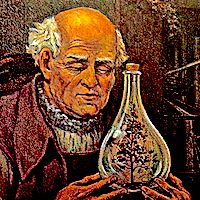
Paracelsus (Theophrastus von Hohenheim)
1493 – 1541 CE
Revolutionary, shamanistic alchemist
“Father of toxicology,” alchemist, medical revolution pioneer, and astrologer; Paracelsus was venerated by the Rosicrucians, intensively studied by Carl Jung, and revered by future physicians who universally recognize his medical contributions. He criticized the popular purging and bloodletting techniques of his time as well as the practices of applying cow dung to wounds. He revolutionized medicine by conceiving clinical diagnosis, promoting the keeping of wounds clean, anticipating Germ Theory, using specific instead of cure-all medicines, doing medical experiments on animals, treating mentally ill as treatable instead of possessed by evil spirits, discovering that syphilis is contracted by contact, that “poor blood” can be improved with iron, and creating the terms "chemistry," "gas," and "alcohol.” Jung carried on his work of alchemy as symbolic language expressing unconscious and innate psychological influences.
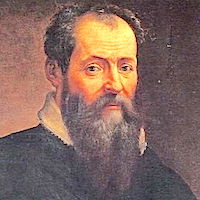
Giorgio Vasari dʒordʒo vaˈzaːri
1511 – 1574 CE
The first art historian, friend and student of Michelangelo, first to use in print the term "Renaissance,” architect, politician and painter; Vasari praised competition and was one of the first writers to use this term related to economics. The first to write a series of biographies about famous artists and describe the continuity of art, his dedication to artists and their art was so great that he once ran into the peril of a rioting crowd to rescue the pieces from an arm of Michelangelo’s statue “David” they had broken with a bench. Unlike many artists unrecognized until after their death, he was famous during his lifetime, became very wealthy, and even a powerful politician.
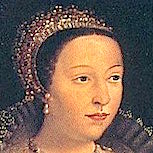
Catherine di Medici
1519 – 1589 CE
Queen of France, niece of Pope Leo X, mother of 3 kings and 2 queens (after resorting to using cow dung and drinking mule's urine), and one of the most influential people of her time; Catherine di Medici’s famous parents died from syphilis shortly after her birth and she was immediately caught up in political intrigues which at one point forced her into a convent for 3 of her happiest years. For 30 years she sponsored musicians, painters, sculptors, architects, Montaigne, and every branch of art. Continually working for peace in a time of many wars, she tried to reconcile Catholic-Protestant factions but underestimating the power of belief over reason, but this only generated wars that brought to the surface her great political and strategic skills but also earned her acclaim as a Machiavellian witch.

Gaspara Stampa
1523 – 1554 CE
Unrecognized during her life with only 4 of her more than 300 sonnets and poems published, Gaspara is now considered one of the best 16th century lyricists and greatest Italian woman poet of any time. From a merchant class and not nobility like the other poets of her time, she didn’t let her humble origin and lack of credentials stop her from writing some of the most memorable works of her era. Also a wonderful singer and lute player, she transformed the pain of unrequited love into inspired artistic creation that became a milestone in women's literature and a huge inspiration for Rainer Maria Rilke and many others.
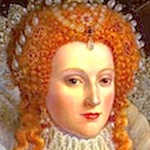
Elizabeth I (Gloriana, The Virgin Queen)
1533 – 1603 CE
Though far from a sage or saint, Elizabeth began her reign with England reviled and powerless but left it 45 years later rich and strong. Called by historians “The greatest ruler England has ever had,” she was patron to Shakespeare, Bacon, Marlowe, and Drake launching the scientific revolution and a golden age of progress and learning. Excommunicated by Pope Pius V, she believed that faith was personal, became “mother of the Church of England.” She opened up trade with the Islamic Ottoman Empire, and helped end the Vatican’s power over all Europe. Though stained by abuses in Ireland, she listened to popular sentiment and advice dedicating her life to her country and people becoming a symbol for good government and resistance to foreign threat.

Montaigne
1533 – 1592 CE
Grandfather of the Enlightenment
Son of a fish-seller, grandfather of the Enlightenment, “the first modern man,” statesman, author, apostle of doubt and moderation, Renaissance author most in harmony with the modern mind; Montaigne wrote some of history’s most influential essays. A master story-teller balancing philosophy with personal anecdote, deep insight with entertainment, wisdom and humor; he built on Lucretius and had a direct influence on Francis Bacon, Descartes, Pascal, Rousseau, Emerson, Nietzsche, and Shakespeare. “The most pagan of Christians,” called “the wisest Frenchman that ever lived,” he is still “read today as if he had written yesterday
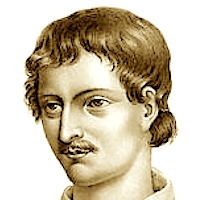
Giordano Bruno
1548 – 1600 CE
Giordano Bruno (1548 – 1600)
Like Galileo, a "martyr of science," Dominican friar, Epicurean poet, cosmological mathematician; Bruno fled his monastery and wandered through France and Italy teaching. Burned at the stake by the Roman Inquisition for his scientific, pantheistic, and Epicurean views; Bruno first described stars as distant suns with planets of their own, championed the Copernican view that the earth is not the center of the universe, and taught the dangerous view that likewise people and our civilizations are not the center of the cosmos but only a tiny part of something much larger. This led to an 8-year trial, his torture and death but also a strong foundation for the newly emerging sciences and the openness to free thought.

Francis Bacon
1561 – 1626 CE
“Father of the scientific method,” Lord Chancellor of England, orator, jurist, and philosopher; Francis Bacon represents a huge step in the evolution of consciousness but not before indulging in a sybaritic lifestyle, being charged with 23 cases of corruption, being banned from Parliament and imprisoned in the Tower of London. In his ex-con life, he undermined the strength of religion, railed against tradition and authority, became “the most powerful and influential intellect of his time,” warned of the rich getting too rich as a cause of social disease and revolt, the likelihood of new inventions causing more harm than help, and championed the rise of reason and science that brought about our modern world.
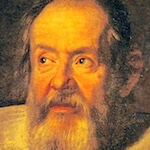
Galileo
1564 – 1642 CE
Arrested by the Inquisition for the last 9 years of his life but called by Einstein “the father of modern science;” books banned by the Catholic Church but called by Stephen Hawking responsible for the birth of modern science; condemned and persecuted by conservative contemporaries but called by Grotius “the greatest mind of all time;” Galileo – though living in a time when “heretics” were burned at the stake – raised the status of science, with his telescope designs demonstrated the universe’s immensity, and helped science separate from both philosophy and religion.
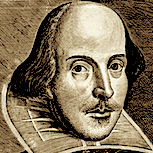
William Shakespeare
1564 – 1616 CE
The greatest writer in the English language whose works - 400 years after his death - have been translated into every living language and remain popular, respected, studied, and performed throughout the world; Shakespeare was as Ben Johnson wrote, "not of an age, but for all time.” When 18 years old, he had his first child 6 months after getting married and before long became a playwright and actor in his own and others’ plays. Unlike many of the prime movers on our biography lists, Shakespeare, though not revered, was successful during his lifetime (as a businessman) and by the time he was 33 while living in London owned the second largest home in Stratford. His influence not only revolutionized drama, scholars link more than 20,000 pieces of music to his writings, many famous paintings, his language helped shape modern English and common everyday phrases, Sigmund Freud drew heavily on him while developing his psychology theories, and Durant describes his influence as moving us to the depths of our spirit.
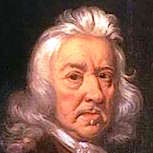
Thomas Hobbes
1588 – 1679 CE
Secretary, student, friend to Francis Bacon; Hobbes established the foundation for most modern political philosophy. Formulating social contract theory, he promoted individual rights, natural equality, government based on the will of the people, only representative government as legitimate, and the freedom to do anything that laws don’t forbid. He described human nature as “self-interested cooperation” and introduced mathematical reasoning to the philosophy of science. Though called “the father of totalitarianism” and fixated on peace and order, his radical shift from religion and belief to applying science for understanding human nature helped undermine that same “order” creating more personal, political freedom.
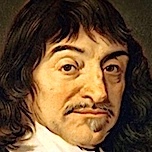
René Descartes
1596 – 1650 CE
Though remaining a Catholic, solidifying the dualistic view in Western thought as well as “Cogito ergo sum” belief in a separate self; Descartes emphasized methodic doubt and the impossibility of externally based intellectual certainty undermining faith in belief and Church doctrine. This sparked a thought revolution that created the modern era. He developed analytic geometry (using x, y, and z for unknowns) and using superscripts for powers or exponents, discovered the law of reflection, and the basis for the development of calculus. Known as the “father of modern philosophy,” he changed the course of Western philosophy and his influence continues to this day.

Balthasar Gracian
1601 – 1658 CE
Spanish Jesuit, philosopher and prolific writer, Gracian amplified the slogan/quote tradition of Aesop, Yang Xiung, the Dhammapada, Atisa and continued by Erasmus and Ben Franklin. At times highly respected, he was also exiled by outraged superiors for his provocative philosophy and lost his teaching tenure. An important influence on Nietzsche, Voltaire, Schopenhauer and Winston Churchill; his book Art of Worldly Wisdom - translated into many languages – continues today as a best seller and exceptionally valuable resource of helpful advice.
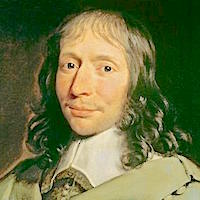
Blaise Pascal
1623 – 1662 CE
One of the greatest French writers of all time
Theologian, inventor, physicist, philosopher; Pascal invented the mechanical calculator, set up the first bus line moving passengers, became one of the greatest French writers, and developed probability theory which has become critical to economics, actuarial science, and the way we understand decision-making and risk. Although he identified with Jansenism which emphasized original sin and human depravity and frequently fixated on religious dogma, his understanding extended to a deep realization of our strong propensity toward projection and self-deception as well as a philosophy of cutting through this kind of deceit and duplicity. His significant scientific contributions led to attaching his name to a programming language, a unit of pressure, and a hydrostatic law. Will Durant called one of his writings, "the most eloquent book in French prose.”

Baruch Spinoza
1632 – 1677 CE
One of the most important, radical, and influential philosophers in the modern era, Spinoza established a strong foundation for democratic political thought, the 18th-century Enlightenment, and a view beyond sectarian religion. Known as ”the prince of philosophers” and one of our greatest thinkers, Spinoza was born Jewish but was excommunicated at an early age. Criticized and ridiculed during his life, he was an important inspiration for Karl Marx, Nietzsche, Goethe, Santayana, Borges, and the deep ecology movement. Albert Einstein said Spinoza was the biggest influence on his world view and Will Durant called him his "favorite philosopher."
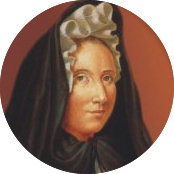
Madame Guyon Jeanne-Marie Bouvier de la Motte-Guyon
1648 – 1717 CE
Madame Guyon, Jeanne-Marie Bouvier de la Motte-Guyon (1648 - 1717)
French mystic, key advocate of Quietism, strong influence on the Quakers and other anti-materialistic Christian traditions; Madame Guyon was widowed at 28 having already borne 5 children. Advocating the ‘prayer of quiet’ and interior realization - teachings of Teresa of Avila and John of the Cross - she ran afoul of the Roman Catholic Church’s emphasis on believing in only external authority, was branded a heretic, and imprisoned in the Bastille for 7 years. Praying all the time and finding her God in every detail of life, she exemplified belief in basic goodness, the sacredness of all experience, and a genuine, European, Wu Wei tradition.

Benjamin Lay
1682 – 1759 CE
Benjamin Lay (1682 - 1759)
Physical dwarf but moral giant, “the world’s first revolutionary abolitionist,” inspiration for generations, wild, confrontational, and uncompromising opponent of slavery; Benjamin Lay wrote over 200 polemics against slavery, sweatshops, over-consumptions, capital punishment, the prison system, decadent rich elites, and for vegetarianism, animal rights and sustainability. Living a lifestyle of almost complete self-sustenance, he grew his his own food, made his own clothes, lived in a cave eating only fruits and vegetables, and wouldn’t use anything that came from the killing of animals. Unconstrained even when abandoned by his fellow Quakers (who later commonly kept pictures of him in their homes), he became the prototype of a class and race-conscious, environmental ultra radical and pioneered ways of protesting still used today.
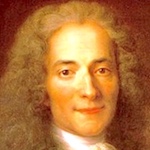
Voltaire, François-Marie Arouet
1694 – 1778 CE
Nemesis to tyrants and fanatics of all styles, powerful fighter for civil rights, separation of church and state, freedom of speech and religion; Voltaire drank up to 72 cups of coffee a day and wrote more than 2,000 books and pamphlets. Admiring Confucian ethics and political theory, his writings inspired the founders of America, the best thinkers of his time, numerous kings, queens and world leaders, millions of people in every generation since. To a large extent we owe to his influence much of the freedoms in the world today; the humane treatment of the insane, sick, and criminal; the number of libraries, schools, and universities for common people. Historian Will Durant wrote, “When we cease to honor Voltaire, we shall be unworthy of freedom.”

Benjamin Franklin
1706 – 1790 CE
Beginning his adult life as a penniless runaway, Franklin became one of the world’s most admired people. He was a founding father, diplomat, scientist, philosopher, businessman, inventor, and the politician most responsible for winning the Revolutionary War. His inventions included the lightning rod, bifocals, the Franklin stove, and he helped start many new civic organizations including voluntary fire departments and paid police forces. He recreated the slogan/quote tradition of Aesop and Atisa that we continue in our “Comments” link.
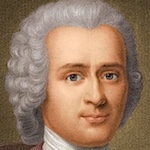
Jean-Jacques Rousseau
1712 – 1778 CE
Motherless from almost birth, abandoned by his father, poor in health and income; Rousseau wandered on his own for 12 years challenging the status quo and rejected by society as a dangerous rebel or insane criminal. Stoned by neighbors when he went for walks, harassed by police, and expelled from countries; he went on to become “the finest thinker of his time,” a main source for Jefferson and the Declaration of Independence, a cause of the French Aid for the American Revolution, and a seminal influence on Tolstoy, Wordsworth, Thoreau, Byron, Shelly, Keats, Schopenhauer, Kant, Goethe, and Marx. He transformed education, inspired the French Revolution and the Romantic Movement, wrote political and social books that became cornerstones of modern thought.
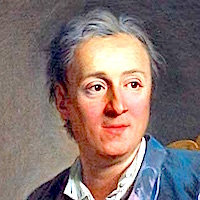
Diderot
1713 – 1784 CE
Philosopher, art critic, scientist, and writer; Diderot was imprisoned in solitary confinement for his philosophical views and mainly only known for his plays and encyclopedia during his lifetime. His rival Rousseau though believed posterity would give him the same respect as Aristotle and Plato and he was later admired by Goethe, Schiller, Balzac, Zola, and Schopenhauer. He was Karl Marx’s favorite prose writer and Comte called him the “foremost intellectual of an exciting age.” He worked on the Encyclopédie as a way of giving power to the common person and emphasized religious tolerance, freedom of thought, the value of science, and—threatening the French aristocracy—maintained that the main purpose of government should be benefiting the common people.
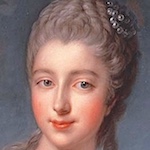
Madame de Pompadour (Jeanne Antoinette Poisson)
1721 – 1764 CE
Called by Will Durant “One of the most remarkable women in history” as “the most cultured woman of her time” and by Voltaire “one of us,” Madame de Pompadour as chief mistress of Louis XV became a brilliant governor of France, protector of Voltaire, savior of Diderot’s Encyclopedie, patron to Rousseau, Montesquieu, and the “Age of Enlightenment” in general. Excommunicated by the Catholic Church and the “Queen of Rococo,” she supported philosophy, literature, music and art as porcelains, hair styles, dresses, chairs, ribbons, beds, and dishes were named after her. Beautiful, charming, and intelligent, she led France to its highest artistic influence on European civilization as well as making her country much stronger economically and politically.
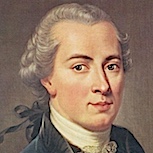
Immanuel Kant
1724 – 1804 CE
Credited with creating a paradigm shift responsible for much of modern philosophy, psychology, metaphysics, sociology, linguistics, and political theory; Kant was a quiet and introverted philosopher whose daily schedule was so precise that neighbors were said to set their watches by it. Child of the Enlightenment and father of the Romantic movement, he barely traveled but became “the central figure of modern philosophy,” inspired the American transcendentalism of Emerson and Thoreau, and a profound influence on many important thinkers like Hegel, Novalis, G. K. Chesterton, Schopenhauer, Bertrand Russell, Max Weber, Jean Piaget, and Noam Chomsky.
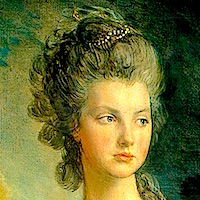
Catherine the Great Екатери́на Вели́кая (Catherine II)
1729 – 1796 CE
Russia’s longest-ruling female leader, “enlightened despot,” author, great patron of the arts, flamboyant and powerful; Catherine the Great helped create and ruled over Russia’s Golden Age revitalizing the institutions, modernizing it’s infrastructure, helping the serfs and emphasizing the arts. She shared more and more power with the nobles, tried to help the peasants, but the rapid expansion of the state relied on taking away much of their freedom and land causing their dissatisfaction and rebellions. She enthusiastically supported the The Enlightenment, helped Russia to become one of Europe’s great powers, greatly expanded colonizations that went as far as Alaska but was accused of many unjust wars. She established the first state-financed higher education institution for women in Europe and supported French philosophers like Voltaire and Diderot when his Encyclopédie was being oppressed in Europe. More licentious than most of her male counterpoints, history records 22 male lovers, many much younger, one only 22 when she was 61.
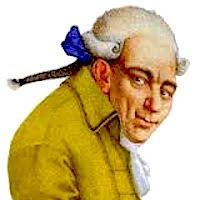
Georg Christoph Lichtenberg
1742 – 1799 CE
One of history’s best aphorists
Youngest of 17 children, scientist, professor of physics, satirist, and hunchback; Lichtenberg had a major influence on the culture of his times that extends into the modern world. He discovered tree-like electrical patterns now called Lichtenberg figures or fractals, the basic principles used now for copy machine technology, a “Compass of Motives” praised by Freud and also standardized the paper sizes now used in most of the world. Considered one of history’s best aphorists, he was read and admired by wisdom lineage holders like Arthur Schopenhauer, Friedrich Nietzsche, Sigmund Freud, Leo Tolstoy, and even Chinese scholars like Qian Zhongshu.
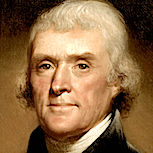
Thomas Jefferson
1743 – 1826 CE
American founding father, main author of the Declaration of Independence, Virginia governor, first Secretary of State, US Vice President and one of America’s greatest presidents; Jefferson negotiated the Louisiana Purchase almost doubling the size of the country and wrote a book considered the most important American one written before 1800. President of the American Philosophical Society, mathematician, architect/designer of the Virginia State Capitol and Monticello, University of Virginia founder, avid horticulturalist and farmer, naturalist deeply interested in birds, inventor of an important new plow design as well as the swivel chair, and speaker of more than 8 languages; he exemplified the ideal of a true Renaissance Man. Although he owned hundreds of slaves, as a young lawyer he defended freedom-seeking slaves, signed an act prohibiting their importation in 1807, and is believed to have secretly “married” and had children with a black woman, Sally Hemings. Always in debt with cash flow problems from continual experiments and pushing on the boundaries of the possible, his creative spirit never died.
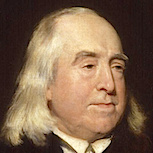
Jeremy Bentham
1748 – 1832 CE
Jeremy Bentham (1748 - 1832)
“The first patron saint of animal rights,” founder of modern utilitarianism, philosopher, and social reformer; Bentham defined “the greatest happiness of the greatest number” as a political strategy and brought the idea of welfare into modern government. A strong voice for individual and economic freedom, he worked hard to end slavery, the death penalty, physical punishment, and was the first in England to argue for decriminalizing homosexuality. He promoted equal rights for women, universal education, the separation of church and state, and animal rights. His secretary was John Stuart Mill’s father and together they tested the limits of education.
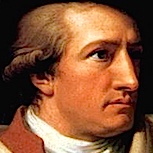
Goethe, Johann Wolfgang von
1749 – 1832 CE
Though a literary celebrity at 25 and most well known for his novels and poems, Goethe was also a natural philosopher, diplomat, civil servant, geologist, and scientist who developed a theory of color, inspired Tesla’s discovery of alternating current and whose early work on evolution influenced Charles Darwin. A freethinker who blended Christianity with pantheism, humanism, and other esoteric traditions, he became a major influence on Hegel, Schopenhauer, Kierkegaard, Nietzsche, Hesse and Jung. He authored some of the greatest novels ever written and his poems were set to music by Mozart, Beethoven, Schubert, Brahms, Liszt and many others. Continuously creating for 82 years, his wisdom deepened and merged into a culture we take for granted today.
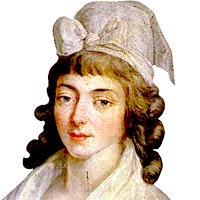
Madame Roland (Marie-Jeanne Phlippon)
1754 – 1793 CE
Revolutionary heroine
Sole survivor of her mother’s 8 pregnancies, Madame Roland became a revolutionary heroine and one of the mainspring influences of the French Revolution. A student of Plutarch, Voltaire, and Rousseau; her clear intelligence, wisdom and drive made her the equal to any of the contemporary politicians proving the capabilities of women in the political realm. Her drive, focus, and radiant intelligence made her the equal in accomplishments of any contemporary male politician. Sacrificing her life for her political beliefs, she died by guillotine during the French Reign of Terror with the famous words, “Oh Liberty, what crimes are committed in thy name!”. Her memoirs written in prison became a testament to the possibility of balancing freedom and equality as well as evolving potentials for a woman’s place politics.

William Blake
1757 – 1827 CE
A poet, painter, and songwriter mainly unrecognized during his life and at the time considered mad, Blake is now called “far and away the greatest artist Britain has ever produced” and “a seminal figure in the history of poetry.” Not fully appreciated until more than 200 years after he died, he’s now considered one of the most powerful impacts on twentieth century culture with an enormous influence on Carl Jung, Aldous Huxley, poets like William Butler Yeats and Allen Ginsberg, songwriters like Bob Dylan and Van Morrison. The origin of graphic novels and fantasy art trace back to Blake.
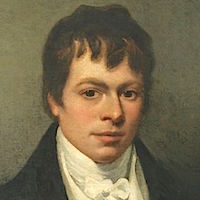
Robert Burns
1759 – 1796 CE
Tenant farmer, tax collector, "The Greatest Scot of all time,” people's poet of Russia, political radical, and writer of one of the wold’s most popular songs (Auld Lang Syne); Burns celebrated everyday life, farming, culture, religious practices, and love. Father of at least 13 children (most born out of wedlock) with at least 5 different women, his affairs were unencumbered even by loves who inspired some of the best love songs ever written. Far beyond it’s place as favorite US New Year’s Eve song, Auld Lang Syne is sung all over the world, was the Korean and Maldive national anthem, popular graduation song in Japan, and sung by troops in the American Civil War and during World War I.

William Wordsworth
1770 – 1850 CE
Orphaned at an early age, connected with the common man while wandering through Europe on foot, caught up in both the ups and downs of the French Revolution, and Britain's only Poet Laureate who wrote no official verse; Wordsworth defined poetry as "the spontaneous overflow of powerful feelings” and along with Samuel Coleridge, used poems based in common language to help launch the Romantic Age of literature. A student of John "Walking" Stewart who blended yoga and Eastern wisdom from India with western pantheism, he published some of the most influential poetry in Western literature.

Novalis
1772 – 1831 CE
Poet, philosopher, mystic and civil engineer, Novalis (Georg Philipp Friedrich Freiherr von Hardenberg) only lived 28 years but in that short time still managed to condense his insight and poetic wisdom influencing Emerson, Hermann Hesse, Rilke, C.S. Lewis, Borges, and through George MacDonald, Tolkien, Mark Twain, GK Chesterton, Madeleine L'Engle. the Inklings, and the entire fantasy genre in literature.
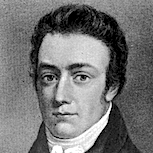
Samuel Taylor Coleridge
1772 – 1834 CE
One of the most influential English poets, co-founder of the Romantic Movement, prominent philosopher, gothic pioneer and leviathan impact on Mary Shelley, William Wordsworth, Thomas Carlyle, Emerson and American transcendentalism; Coleridge paid for his renown with poor health, depression, bipolar disorder, and a lifetime of opium addiction. Rescuing Shakespeare’s play Hamlet from denigration by critics, he established his reputation as aliterary critic. The instigator of "Conversational Poetry,” using common, everyday language to convey deep images and wisdom, he coined many still-used words like soulmate, selfless, pessimism, relativity, narcissism, actualize, and intensify

Arthur Schopenhauer
1788 – 1860 CE
Though mainly unnoticed during his life, after he died Schopenhauer’s work had a huge impact on psychology, literature, art, philosophy, music and science. He was one of the first Western thinkers to affirm major aspects of Eastern philosophy. He called himself a Buddhist and compared his philosophy to basic Buddhist teachings. Einstein extolled Schopenhauer’s life-long influence and he was also respected and emulated by people like Nietzsche, Tolstoy, Freud, Jung, Joseph Campbell and Thomas Mann. His influence continues today into fields like modern evolutionary psychology.
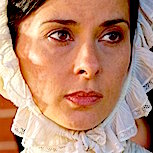
Sarah Grimke
1792 – 1873 CE
Going against her SC Supreme Court chief Justice father who held hundreds of slaves and opposed women’s rights, Sarah supported Abraham Lincoln and her writings fueled and inspired the beginning of the women’s suffrage movement. When she was 5 years old after watching a slave whipping, she tried to leave her state and find a place without slavery. Breaking the law, she taught a slave to read, taught slaves Bible lessons, and against the culture secretly advanced here own "unwomanly” education. One of the first women public speakers in America and under constant criticism and attack, she wrote the first serious essay advocating equality for women and became the first American woman working to end slavery.
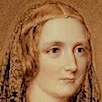
Mary Shelley
1797 – 1851 CE
Caught between her famous father’s Enlightenment political theories (William Godwin) , her famous husband’s allegiance to the ethos of Romanticism (Percy), and her famous mother (Mary Wollstonecraft) who is considered a founder of feminist philosophy; Shelley’s work promoted Taoist-like values emphasizing collaboration over competition, compassion over personal gain, the true civilizing role of the feminine principle. Her novel, Frankenstein foreshadowed our modern era and how easily we can become enslaved and manipulated by our inventions. A voice against superstition and dogma, her books became a beacon for the era of Romanticism, liberal politics, and gender equality.
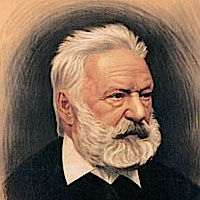
Victor Hugo
1802 – 1885 CE
Literary pioneer, poet, and social justice provocateur
Romantic literature pioneer, poet, artist, and one of the greatest French writers; Victor Hugo’s work influenced most of the social and political issues of his time. His literary success opened doors into the political world and he became more and more involved in politics. He campaigned against capital punishment and social injustice, for more freedom of the press, free education for children, universal voting rights, and a “United States of Europe.” While his books helped create important cultural and social shifts, his political efforts led to exile, a condemnation from Napoleon III, and death threats from mobs outside his house. His political work on ending the death penalty, however, did lead to its abolition in Geneva, Portugal, and Colombia. Two plus million people walked in his funeral procession and today almost all French cities have named streets after him.
Ralph Waldo Emerson
1803 – 1882 CE
Champion of individualism
Friend and mentor to Henry David Thoreau and godfather to William James, Emerson championed individualism as a counterbalance to society’s conformist pressures. He wrote what Oliver Wendell Holmes considered America's “Intellectual Declaration of Independence” and he summarized his philosophy as “the infinitude of the private man.” The most influential writer of 19th-century America, he was called “the Concord Sage” and became the leading voice of intellectual culture in the United States influencing American religions to become more gnostic, less fundamentalist and conservative.

George Sand (Amantine Lucile Aurore Dupin)
1804 – 1876 CE
Intriguing, inspiring, and subversive; France's most famous 19th C. woman writer; friend to Franz Liszt, Balzac, Henry James, Browning, Dostoevsky, and Turgenev; famous lover of composer Chopin, and famous actress Marie Dorval, George Sand was a cross-dressing, cigar and hookah smoking, rebellious and scandalous dramatist and campaigner for important political reforms. Not the most likely person for this list, her creative courage and compassionate kindness make it an easy choice. As she wrote, “Know how to give without hesitation, how to lose without regret, how to acquire without meanness.”

John Stuart Mill
1806 – 1873 CE
One of the most influential thinkers in history, Mill learned Greek at 3 years old, studied Euclid and Latin at 8, Plato at 10, logic and Aristotle at 12, Adam Smith and political economy at 13, chemistry and zoology at 14, and by 20 was suicidal only to be saved by the poetry and inspiration of William Wordsworth. He promoted individual freedom over state control, economic democracy over capitalism, the environment and quality of life over unlimited growth, taxing unearned income high and earned income not at all. He linked freedom with self-improvement, worked to end slavery, and was one of the first in his time to advocate equality for women.
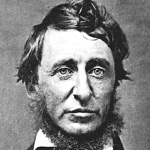
Henry David Thoreau
1817 – 1862 CE
Father of environmentalism and America's first yogi
Dedicated abolitionist, "America's first yogi," champion of nature and the natural, “father of environmentalism;” Thoreau brought a little Lao Tzu into 19th Century America. Instead of following in the pattern of his piers leading a life of “quiet desperation,” Thoreau followed much more in the Tao Te Ching’s style of Wu Wei. His non-violent approach to opposing slavery and the Mexican-American War inspired future leaders like Gandhi and Martin Luther King. Although one of America's most famous writers, during his lifetime his most famous book, Walden didn’t sell enough copies to pay for the paper it was printed on.
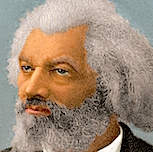
Frederick Douglass
1818 – 1895 CE
International symbol of social justice
Escaped slave, most influential 19th century black leader, adviser to Abraham Lincoln, champion of the working class, author, orator, and newspaper editor; Douglass eloquently agitated for the abolition of slavery, racism and capital punishment; for women’s rights, free public education, and land reform. Calling racism a “diseased imagination,” he convinced Lincoln to let blacks fight in the Civil War and helped enlist troops. Internationally famous, author of an American classic autobiography, a father of liberation theology, and the first African American in many political positions; his memory symbolizes and inspires the spirit of people everywhere to resist oppression and work for social justice.
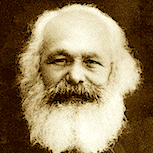
Karl Marx
1818 – 1883 CE
A journalist, philosopher, scientist, and “true founder of modern sociology” and social science; both critics and followers rate Marx as one of the most influential people in all history with a profound impact on world politics, intellectual thought, sociology and economics. A philosopher for the poor and middle classes, he described the economic conflicts of interest that alienate and polarize society between the working classes and the plutocracy. Distorted, corrupted and used by Lenin, Trotsky, Mao, and many other totalitarians; appreciated, developed, and applied by progressive political parties, labour unions, intellectuals, and artists; he brought the scientific method into politics and social theory as well as a powerful alternative to the dehumanizing aspects of capitalistic industrialization. Though questionable in many ways, his work produced a practical and powerful balancing of economic extremes, the exploitation of labor, and the corruption of politicians by the rich. Though more known for his critiques of capitalism, he also appreciated its positive impact on increased productivity, technological progress, and scientific breakthroughs.
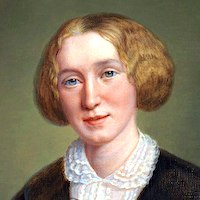
George Eliot (Mary Anne Evans)
1819 – 1880 CE
Pioneering literary outsider
Poet, journalist, translator, novelist, agnostic humanist, political agitator, and courageous follower of her own path; George Eliot wrote what some consider the best novel ever written in the English language (Middlemarch). Known for their psychological insight, her novels reflected her personal experience on the edges of the social, religious, and political fringe. Using a male pen name to escape the strong, feminine stereotypes of her era, this strategy also helped shield her from personal life scandals arising from norm-breaking situations like her adulterous relationship with philosopher George Henry Lewes and her marriage to John Cross who was 21 years younger. Her father didn't consider her beautiful enough to ever find a husband but clearly saw her high intelligence and financed a classical education for her far beyond what was normally available for women. Her father's wealth and high social status also gave her a clear perception of the extreme contrasts between the rich landowners and impoverished people living on those estates. This became a frequent theme in her books.
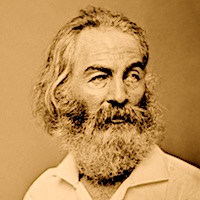
Walt Whitman
1819 – 1892 CE
Premier "poet of democracy" and model for Dracula
“Father of free verse,” one of the most influential American poets, humanist, journalist, Civil War volunteer nurse; Whitman blended realism and transcendentalism and became known as the first "poet of democracy.” His most famous work, Leaves of Grass, was called everything from "trashy, profane & obscene, the author a pretentious ass" to a work more central to American culture than Melville's Moby-Dick, Twain's Huckleberry Finn, and Emerson's The Conduct of Life. Vociferously criticized for being obscene with sexuality themes, it was admired by Thoreau, Ralph Waldo Emerson, Amos Bronson Alcott, and Oscar Wilde. Though biographers assert that Whitman was gay, he always denied it and claimed to have 6 illegitimate children. In a contrast between his poetry and personal views, he promoted equality and true democracy in the former, status quo views of nationalism and racism in the latter. His poetic and vagabond lifestyle inspired the Beat movement, Allen Ginsberg, Jack Kerouac, Gary Snyder, Lawrence Ferlinghetti, Bob Dylan, and Bram Stoker who used him as the model for his character, Dracula.
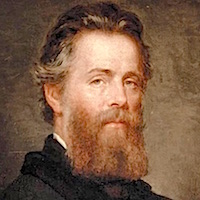
Herman Melville
1819 – 1891 CE
One of the best and most influential of all American writers but almost forgotten and unknown during the last 30 years of his life when he had to take a job as a Customs Inspector; Melville brought myth, scripture, philosophy, and mystical imagery to his haunting novels. Drawing on his adventurous ocean travels, he wrote Moby Dick which was a commercial failure and strongly criticized when first written but became a world classic described by D. H. Lawrence as "the greatest book of the sea ever written" and "one of the strangest and most wonderful books in the world.” Portraying the delicate dance between truth and illusion, the impossibility of deep and mutual communication, and the search for the absolute in the relative; his works gave a deep and powerful color to world literature.
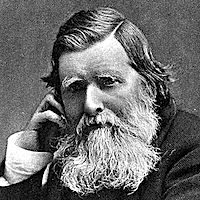
John Ruskin
1819 – 1900 CE
John Ruskin (1819 - 1900)
Strong and continuing international advocate for sustainability and protecting the environment, Christian socialist, leading Victorian era art critic, poet, philanthropist, and social thinker; Ruskin wrote over 250 manuscripts, influencing his contemporaries and many strands continuing today into modern culture. Admired by Proust, Gandhi, and Ryuzo Mikimoto in Japan; Leo Tolstoy called him, "one of the most remarkable men not only of England and of our generation, but of all countries and times.” Emphasizing the unity of nature, art, and culture; he developed principles for an ideal society which were used to set up many “Utopian Colonies.” His ideas helped found the modern Olympic Games, the British welfare state, many kind of social insurance programs, as well as the “garden city movement” that first included "greenbelts" in urban planning.

Florence Nightingale
1820 – 1910 CE
The founder of modern nursing, she started the first secular nursing school in the world, emphasized preventive medicine and holistic health, improved healthcare for all classes as well as hunger relief in India. She helped abolish harsh prostitution laws and expanded acceptable roles for women. A strong Christian, she was critical of organized religion, appreciated pagan and eastern religions, and strongly opposed discrimination of all kinds. She inspired worldwide health care reform and her work improved the situation for women everywhere. Her influence remains strong and the Florence Nightingale Declaration has been signed by over 18,500 nurses from 86 countries.
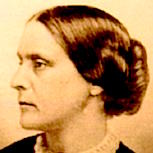
Susan B. Anthony
1820 – 1906 CE
Harshly ridiculed, accused of trying to destroy marriage and the family, arrested for voting; Susan B. Anthony started working to end slavery as a teenager and later ran the largest petition drive against it. Giving up to 100 speeches a year, she organized and campaigned for equal rights leading to the Nineteenth Amendment (popularly called the “Susan B. Anthony Amendment”) giving women the right to vote in 1920. The first woman to be on a U.S. coin, she gave "the most famous speech for woman suffrage,” and her efforts led to legal rights for married women, women being able to attend colleges, and a fundamental, cultural attitude change.
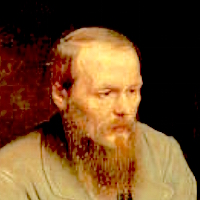
Fyodor Mikhailovich Dostoyevsky Фёдор Миха́йлович Достое́вский
1821 – 1881 CE
One of history’s most influential novelists and one of the greatest psychologists in world literature; Dostoyevsky led a tortured life that included being arrested for discussing banned books, being sentenced to death, spending 4 years in a Siberian prison camp, 6 years of forced/exiled military service, and struggling with a gambling addiction that made him have to beg for money. His second wife who he met when she was 19 and he 25 years older, helped turn his life around and produce some of the world’s best literature. His books have been translated into more than 170 languages and he was admired by Hermann Hesse, Ernest Hemingway, James Joyce, Kafka and Sartre. Albert Einstein called him a "great religious writer,” Nietzsche “among the most beautiful strokes of fortune in my life", Sigmund Freud called The Brothers Karamazov "the most magnificent novel ever written,“ and Virginia Woolf said, "Out of Shakespeare there is no more exciting reading.” His influence in modern time extends to the existentialists, surrealists, and the Beat generation.
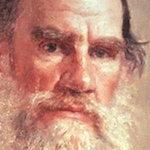
Leo Tolstoy
1828 – 1910 CE
One of the greatest authors of all time, Tolstoy’s dedication to nonviolent resistance had a deep impact on leaders like Mohandas Gandhi and Martin Luther King. His influence on education was opposed and stopped by Tsarist secret police but still became the first example of democratic education. Inspired by the Buddha, Confucius, and Chinese traditions, he was a strong Christian in a style like the early Gnostics and believed in seeing “The Kingdom of God Is Within You” rather than relying on an external church organization or priests. Excommunicated from the Russian Orthodox Church, he revived and inspired an authentic and practical Christian philosophy.

Mark Twain (Samuel Langhorne Clemens)
1835 – 1910 CE
America’s most famous author
Riverboat captain, adventurer, bankrupted businessman, inventor, and America’s most famous author; Mark Twain, with his wit, wisdom, insight, and humor influenced and continues to positively influence the world. A strong supporter of women's, religious, racial, and labor rights; he wrote scathing indictments on war, patriotic, and religious bigotry and published new work in 3 different centuries. Though disliked by his wife Livy, his book The Adventures of Huckleberry Finn ranks among history’s all time best. Ernest Hemingway said, ”All modern American literature comes from one book by Mark Twain called Huckleberry Finn.”
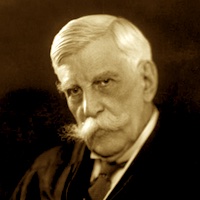
Oliver Wendell Holmes Jr.
1841 – 1935 CE
Game-changing Supreme Court Justice
One of America’s most respected and influential judges of all time, Holmes still holds the record for the oldest Supreme Court Justice. His family was close friends with Henry James Sr. and Ralph Waldo Emerson; he became close friends with William James and Henry James Jr. His often-cited, penetrating comments supported civil liberty, freedom of speech, and progressive, democratic ideals. His legal opinions formed the foundation for Roosevelt’s New Deal.
His book, The Common Law (still in print after more than 140 years), remains a source for heated debates. Opposing attitudes based on opinions about any kind of absolute truth, it describes law as an evolving process based on the changing attitudes and insights of society.
Appointed to the Supreme Court by President Theodore Roosevelt, he became one of the greatest judges but disappointed and alienated Roosevelt when he ruled against an anti-trust case particularly close to him. He approved trade unions and their ability to organize and strike, supported eugenics laws, and earned a reputation as 'The Great Dissenter.'
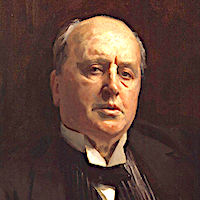
Henry James
1843 – 1916 CE
One of history’s greatest novelists, brother of William James, and 3-time Nobel Prize nominee; Henry James pioneered experimental literary techniques that deepened characters from overly simplistic caricatures to realistic depictions of ambiguity, paradox, and contradiction. Breaking from the romantic tradition of Charles Dickens, he experimented with literary styles and introduced more realism trying to involve readers more personally and influence them emotionally rather than just as distant and uninvolved observers. This attracted much criticism but also evolved literary styles to include more emphasis on psychological states of mind and the ability to inspire.
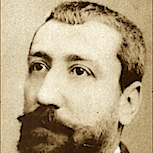
Anatole France (Jacques Anatole Thibault)
1844 – 1924 CE
Son of a bookseller and true bibliophile, librarian for the French Senate, and modern lineage holder of Epicurean thought; Anatole France was venomously attacked by Nazi collaborators but defended and admired by George Orwell. His entire set of writings were banned and prohibited by the Roman Catholic Church but in 1921 awarded the Nobel Prize in Literature "in recognition of his brilliant literary achievements, characterized as they are by a nobility of style, a profound human sympathy, and grace.” Journalist, poet, social commentator, historian, playwright, and famous novelist; he became the model for a narrator in Proust's In Search of Lost Time.
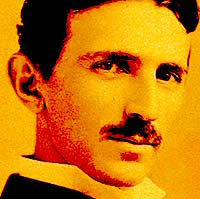
Nikola Tesla Никола Тесла
1856 – 1943 CE
Nikola Tesla, Никола Тесла (1856 – 1943)
Prototype of the “mad scientist,” engineer, futurist, poet, philosopher, linguist, humanist, close friend of Mark Twain, and son of a Serbian Orthodox priest; Tesla and his development of the induction motor helped tip the scale in the “War of Currents,” the AC vs. DC power struggle between Edison and Westinghouse. This made him instantly very rich but he soon spent everything on developing new inventions and he often lived in hotels sneaking away without paying the bills. He invented systems for wireless lighting which didn’t make money but created the foundation for wireless applications used today. He spoke 8 languages, invented radio remote control, a steam-powered oscillating generator, helped design the Niagara falls power system, took the first X-ray image, and received almost 300 patents in 26 countries.
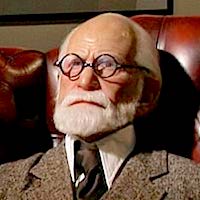
Sigmund Freud
1856 – 1939 CE
Dismissed and laughed at because of his more outlandish theories, it’s too easy to overlook Freud’s many deep insights. Founder of psychoanalysis and inspiration/influence for many of the important psychologists who came after him including Jung, Adler, Erich Fromm, Wilhelm Reich, and Fritz Perls; he developed many techniques and understandings for treating mental illness—ideas like free association, transference, the Oedipus complex, repression, libido, a theory of the unconscious, and an id-ego-super-ego psychic structure. Fromm—though critical in many ways—described Freud (along with Marx, and Einstein) as an "architect of the modern age,” believed he permanently changed the way we understand human nature, but thought psychoanalysis quickly became corrupted. Although such a famous name today, during his lifetime Freud shared some of the obscurity common to most history-changing people. His influential book, The Interpretation of Dreams (1900) only sold 351 copies during the first 6 years after publication.
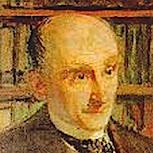
Henri-Louis Bergson
1859 – 1941 CE
The Plotinus of our era, proponent of the Lucretian tradition, awarded the 1927 Nobel prize in Literature and France’s highest honor the Grand-Croix; Bergson developed an open and nonsystematic philosophy based on mystical experience and a revolutionary concept of Multiplicity to replace dualism and Hegel’s dialectic. Close friend and collaborator with William James; Nikos Kazantzakis studied under him, his ideas on creative evolution influenced Teilhard de Chardin, and his ideas were provocative enough to be condemned by the Vatican and criticized by Bertrand Russell, Heidegger, Sartre, T.S. Eliot, Julian Huxley, Einstein, even Virginia Woolf. A Jew converted Catholic, he emphasized immediate experience and intuition over reason and science — the sense over the words.
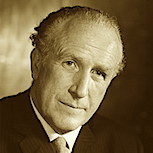
Arthur Desmond
1859 – 1929 CE
Arthur Desmond (c. 1859 – 1929), aka Arthur Uing, Ragnar Redbeard, Richard Thurland, Desmond Dilg, Gavin Gowrie
Bank-bashing heroic reformer, “The Poet of Revolution,” author, and politician; Desmond started a political organization dedicated to “emancipation from poverty, competitive commercialism, industrial wage slavery, tyrannical authority, and mental bondage." Like Machiavelli and his satirical book The Prince, Desmond was slandered by the rich and powerful plutocrats of his time as an immoral, satanic figure, advocating Social Darwinism, racism, and fascism. His book, Might Is Right, however, was called by fellow labor movement collaborators, “one of the greatest books ever written." He promoted land reform, the nationalization of large estates and banks, single taxation and called bank directors "scoundrels", large estate owners "blood-sucking leeches" and the local press as "hirelings of monopoly.”
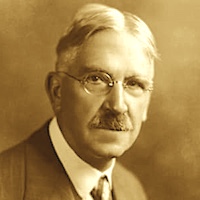
John Dewey
1859 – 1952 CE
The "Second Confucius"
American philosopher, psychologist, one of the original 34 signatories of the first Humanist Manifesto, major voice for progressive education and academic freedom; Dewey is considered the “epitome of liberalism,” “one of the fathers of functional psychology,” leading proponent of hands-on learning, and a powerful advocate for democracy. Writing 40 books and over 700 articles in 140 journals, he helped establish the NAACP, supported immigrants, and the women’s suffrage movement. He worked closely with Albert Einstein, Bertrand Russell, Karl Jaspers, Henri Bergson, Martin Buber, and George Santayana; established a college where the faculty included Buckminster Fuller, Paul Goodman, and the Beat Generation "Black Mountain Poets.” One of his students, B.R. Ambedkar, became one of the founding fathers of independent India. President of the League for Industrial Democracy, he refuted the influential Walter Lippmann views on the need to manipulate democracy by using journalism as propaganda. He lived in China during 1919-1922 giving nearly 200 lectures to thousands Chinese audiences who described him as "Second Confucius.” Returning, he gave lectures in the USA discussing the teachings of Laozi.
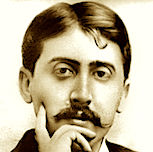
Marcel Proust
1871 – 1922 CE
Apostle of Ordinary Mind
Apostle of ordinary mind, the “Proustian moment,” and one of the world’s greatest novelists; Proust never worked a job, suffered ill health his entire life, lived with his parents, and spent his last years in bed sleeping all day and writing all night. W. Somerset Maugham called his 3200-page novel, In Search of Lost Time the "greatest fiction to date” and - a huge influence on modern writers - it’s Michael Chabon’s favorite book, in lists of top 10 greatest books of all time, and called "the most respected novel of the twentieth century." Abandoning dramatic action and complicated plot, his novels evoke the sacred in the commonplace, wonder and magic of ordinary experience, and propose art in everyday life as the true meaning of life deeper than all fame, fortune, pleasure, power, or even love.

Bertrand Russell
1872 – 1970 CE
“20th century Voltaire”
Bertrand Russell (1872 - 1970)
Nobel laureate for championing “humanitarian ideals and freedom of thought,” famous logician, polymath, historian, writer, and social critic; Russell promoted a world government and a "scientific society.” From one of the UK’s most prominent aristocratic families, he dedicated his life to political and social activism trying to abolish war, poverty, prejudice, and imperialism. A prominent anti-war activist, he went to prison during World War I. In his early 70’s he recreated himself; continued a strong, active and relevant life being arrested and jailed for 7 days because of an anti-nuke protest when he was 89; and persevered using his considerable political influence up until days before he died at 97. A major influence on the development of computer science and artificial intelligence, he worked for nuclear disarmament, gay rights, and world peace.
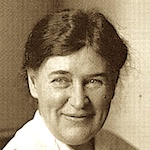
Willa Cather
1873 – 1948 CE
Modern day Lao Tzu
Wonderful novelist with a flare for evoking a deep appreciation for nature and the natural world, Willa Cather championed the values of self-sufficiency, independence, and harmony with nature. Nostalgic for the time when most people lived on farms, she used “the rising and setting of the sun” as a major theme and honored the struggle of exiled immigrants. Infusing meaningfulness and sacred outlook into simple, daily tasks she unknowingly continued the Zen spirit and understanding Lao Tzu wrote about so much longer before.
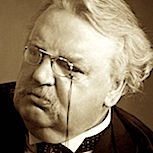
G. K. Chesterton
1874 – 1936 CE
Social critic, theologian, and philosopher turning popular proverbs inside out with deep insight and laugh-out-loud humor; Chesterton was called both the best writer and best thinker of the 20th century, “the most unjustly neglected writer of our time,” and the "prince of paradox.” One of the most prolific authors of all time, he wrote more than 100 books, hundreds of poems, plays, short stories and over 4000 newspaper articles. Over 300 pounds and 6’4,” normally wandering around lost with a cigar in his mouth, writing many of his articles in train stations after inadvertently missing his train; he criticized both capitalism and socialism predicting the modern polemic stalemate of progressives “continually making mistakes” while conservatives continue to “prevent the mistakes from being corrected." He influenced atheist C.S. Lewis’s conversion to Christianity, the movement for Irish Independence, and Gandhi’s movement to end British colonial rule. He “changed the life” of Marshall McLuhan and inspired the novels and writings of Neil Gaiman, Terry Pratchett, Ernest Hemingway, Graham Greene, Agatha Christie, Jorge Luis Borges, George Bernard Shaw, H.G. Wells, E.F. Schumacher, Bertrand Russell and many more.
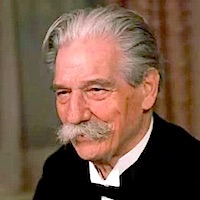
Albert Schweitzer
1875 – 1965 CE
An authentic Christian who didn't hesitate to criticize Christian extremism and hypocrisy, who genuinely practiced his faith by effective humanitarian work in Africa, and who realized a mystical and scientific union of individual and environment; Albert Schweitzer conveyed a deep reverence for all life and taught how destroying our environment is also destroys ourselves. Considered the greatest humanitarian of his day, he gave up a comfortable life as a professor and scholar to become a medical missionary in some of the world's most poverty-stricken places in Africa. After receiving the Nobel Peace Prize in 1952, he gave what many consider one of the best speeches ever given. His work against developing the atomic bomb, however, brought him under FBI/CIA scrutiny, public criticism, and the loss of financial support.

Rainer Maria Rilke
1875 – 1926 CE
Profound singer of universal music
One of the most popular and best-selling poets of all time, a Catholic who believed that Jesus had a baby with Mary Magdalene, secretary to famous sculptor Rodin, lover and confidant of married Sigmund Freud student, psychoanalyst, and Nietzsche’s love focus, Lou Andreas-Salomé; Rilke’s mystical writings are still frequently quoted on TV, in movies, music, and self-help books. Taking art as religion and the only source of human redemption, he reconciled dichotomies like life and death, suffering and joy, beauty and destruction unifying opposites and finding deep meaning is all experience. He described god as nature, life force, and an evolving consciousness only slowly coming into existence. Hermann Hesse wrote that “through him resounds the music of the universe.”

Hermann Hesse
1877 – 1962 CE
Guiding light for a world-wide cultural transition, spiritual teacher to the Beat generation, poet at heart and in life, soul of his age; Hesse was expelled from a Protestant seminary, denounced by the German media when he protested German’s involvement during WWI, and his books were banned and destroyed by Hitler. The 20th century’s most widely read European author, his books personify the balance between freedom and equality, the individual and society and the integration of opposites extolled by the non-thought lineages. After writing Nobel Prize-winning book, The Glass Bead Game, he devoted his life to mentoring young people and collaborating with peers like Thomas Mann and Carl Jung. He wrote over 30,000 letters to hundreds of different correspondents

Albert Einstein
1879 – 1955 CE
Although he made his name synonymous with genius as the father of modern physics and his E = mc2 became ”the world's most famous equation,” Einstein remained humble and unassuming. Although winning a Nobel Prize and writing over 30,000 documents, he didn’t let himself be seduced by fame and fortune but championed civil rights, non-violence, and - like Chuang Tzu and other famous Taoists - refused political honors including becoming the president of Israel. He worked hard for checking the power of nation states with a democratic global government, believed in a pantheistic god, and as an avid violin player said, “I often think in music.”
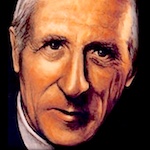
Teilhard de Chardin
1881 – 1955 CE
Philosopher, geologist, Jesuit priest and paleontologist, Chardin traveled extensively across China and helped discover Peking Man. Although frequently condemned and censored by church officials and his writings banned, later popes, cardinals and theologians praised him and his ideas. Similarly reviled and revered by scientists and described as everything from a “charlatan” to “one of the century’s most prophetic thinkers,” his life manifested the cutting edge of consciousness evolution he described so clearly.
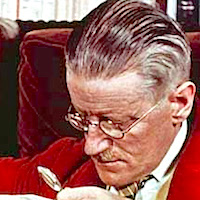
James Joyce
1882 – 1941 CE
James Joyce (1882 – 1941)
Polyphonic novelist, poet, one of the most influential 20th century writers, stream of consciousness avant-garde modernist; Joyce revolutionized modern fiction while - according to a psychoanalyst - using his writing to avoid a complete psychotic break. A huge influence on philosophers and writers as varied as Borges, Rushdie, Beckett, Robert Anton Wilson, Joseph Campbell, and John Updike; his influenced crossed over into the world of science as he became the source of the now popular scientific term, “quark..” Finnegans Wake - considered the most challenging work ever written in the English language - shines as a monument to the possibilities of creative spirit unshackled by regard for public opinion. Although considered one of the greatest novels ever written., controversy and resistance kept his novel Ulysses from being published in the USA until 12 years after it was written. His writing style and content brings out the deeper reality of situations and experiences pointing toward the sense rather than the words.
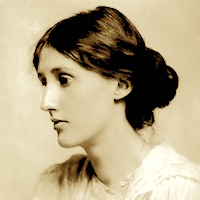
Virginia Woolf
1882 – 1941 CE
Stream of consciousness writing pioneer, one of the most influential 20th century writers, “the major lyrical novelist in the English language,” and “feminist inspiration;” Woolf struggled with mental illness all her life and yet wrote some of the era’s best short stories and novels, some translated into 50 languages. A deep influence on world culture, she promoted universal education, intellectual freedom, class equality, and feminism. Still popular today, the National Portrait Gallery in London sells more of her postcards than of any other. With a deep understanding of inner, psychological struggle, her characters expose the sacred within the ordinary, the profound in the midst of the commonplace.

Kahlil Gibran
1883 – 1931 CE
After Shakespeare and Laozi, Gibran is the third best-selling poet of all time. His friends included WB Yeats, Carl Jung and Auguste Rodin. Elvis Presley was deeply influenced by Gibran, read passages to his mother, made notes in the margins, and gave away copies of The Prophet to his friends. Johnny Cash was also a big fan and John Lennon adapted lines from his poetry into his songs.
{Maronite Christian, Bahá’í, Sufi}
The Prophet, Sand and Foam, The Earth Gods, The Broken Wings, Love Letters in the Sand.
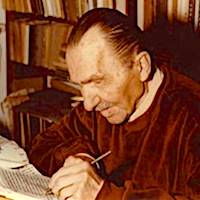
Nikos Kazantzakis
1883 – 1957 CE
Fearless philosopher, poet, translator, prolific writer, and spiritual alchemist; Kazantzakis was condemned by the Catholic Church and the Orthodox Church wouldn’t even let him be buried in a cemetery. He followed in the Zen/Taoist tradition of synthesizing opposites and reconciled Buddhism and Christianity, philosophy and politics, sensuality and a spiritual path. An extensive traveler in both the east and west, he was given the International Peace Award and made great contributions to culture beyond nationalism, religion, and sectarian view.
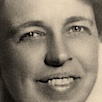
Eleanor Roosevelt
1884 – 1962 CE
Longest-serving First Lady in the history of the United States, Eleanor was mentor and guiding influence behind her powerful and famous husband, blending his charisma with her wisdom. Though a terrified introvert, she was the first First Lady to be on talk radio, address a national convention, hold a press conference, write a newspaper column and averaged 150 lectures a year throughout the 50’s. She championed civil rights, women’s rights, helped write the Universal Declaration of Human Rights and became chairperson of the UN Commission on Human Rights. Called the “First Lady of the World” by Harry Truman, she received thirty-five honorary degrees and two of her speeches are on the Top 100 Speeches of the 20th Century.

Will Durant
1885 – 1981 CE
Philosophy apostle and popularizer of history's lessons
Apostle for philosophy, Catholic priest vocation drop-out, socialist reporter, librarian, professor who quit so he could marry his much younger 15 year-old student who became his 68-year married wife; Durant became not just an ivory-tower intellectual and academic but someone who put the lessons of history into practical lessons useful for average people. He worked for women’s right to vote, equal wages, better working conditions for American labor, and wrote a "Declaration of Interdependence,” that was read into the Congressional Record and started a movement against racial intolerance 10 years before the Civil Rights Movement. Writing “the most successful historiographical series in history,” and awarded a Pulitzer Prize for literature as well as the Presidential Medal of Freedom, he critiqued the West’s “fatal error of perspective:” Eurocentrism, intolerance and provincialism.
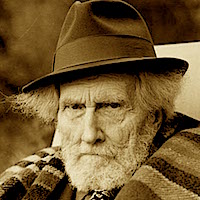
Ezra Pound
1885 – 1972 CE
Major influence on modern poetry, developer of Imagism, critic of international capitalism to the extent of supporting Hitler and Mussolini; Pound helped to discover, animate, and promote literary figures including Ernest Hemingway, T. S. Eliot, James Joyce, and Robert Frost. The depth and genius of his writing was tarnished by his political views and actions which resulted in being convicted of treason, solitary confinement and probably torture in a US military prison that caused a mental breakdown and 12 years of incarceration in a Washington, D.C. psychiatric hospital. Considered by Arthur Miller “worse than Hitler” and called a "National Monster" by many; Hemingway wrote that his writing “will last as long as there is any literature" and Carl Sandburg that "All talk on modern poetry, by people who know, ends with dragging in Ezra Pound somewhere.” In later life he confessed to his Jewish protege Allen Ginsberg his confused belief in ideologies and that, “Any good I've done has been spoiled by bad intentions […] But the worst mistake I made was that stupid, suburban prejudice of anti-semitism.” Although sages warn against flattery and recommend welcoming criticism, Pound’s anti-semitism and support for fascism make it extremely difficult although increasingly important to openly hear his valid criticisms of our culture and state of civilization. The smartest people learn from smart people’s mistakes.

Pearl Buck
1892 – 1973 CE
Growing up and living in China as the daughter and wife of Christian missionaries, Pearl Buck described their arrogance and manipulation arguing against the benefit of missionaries and an institutional church. Denounced in China during the cultural revolution and prevented from visiting with Richard Nixon, she wrote 60+ books, won a Pulitzer, and became the first American woman to win the Nobel Prize for Literature. Long before they became popular or safe positions, she publicly challenged gender and racial discrimination while founding the first interracial and international adoption agency that placed over 5000 “unadoptable” children.
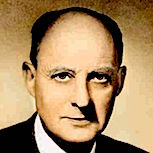
Reinhold Niebuhr
1892 – 1971 CE
Composer of the Alcoholics Anonymous Serenity Prayer, author of a nonfiction book ranked in the top 20 of the twentieth century, "the most influential American theologian of the 20th century,” leading political and cultural commentator for over 30 years; Niebuhr challenged religious conservatives as narrow-minded, religious liberals as naive and taught a middle-way “Christian realism.” Barack Obama’s "favorite philosopher" and a deep influence on Thomas Edison, Jimmy Carter, Martin Luther King Jr., John McCain, and given the Presidential Medal of Freedom by Lyndon Johnson; one of his books was called, "the most important book ever written on U.S. foreign policy.”
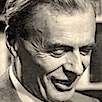
Aldous Huxley
1894 – 1963 CE
With deep insight and keen intelligence, Aldous Huxley for decades using almost every form of media to provide a penetrating commentary on contemporary civilization. Described as “the prophet of the 20th century,” he was nominated for the Nobel Prize in Literature 7 times. He brought into spotlight a vivid image of both the unconscious dark and potential brightness of our evolving technology, social, and political forms animating the dangers of consumption, conformity, technology dependence, indulgence, and pleasure-seeking as well as the potential of the perennial philosophy, finding deep meaning, understanding the sense and not just the words, experiencing the sacredness of each moment.
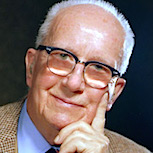
Buckminster Fuller
1895 – 1983 CE
“One of the greatest minds of our times," pioneering solution-solver doing "more with less,” poet, engineering and inventor-genius with 25 patents; Bucky developed a comprehensive and practical perspective on ways to solve world problems. Expelled from Harvard in 1913 and also in 1915 (he later received 47 honorary doctorate degrees) and on the verge of suicide in 1927 when his construction company failed, he went into a 2-year reclusive retreat emerging as one of our greatest global thinkers. His inventions include a winch to rescue boats, a way to better produce concrete buildings, the World Game, the Dymaxion™ house, car, bathroom, grain bin, and many as well as the geodesic dome with now more than 300,000 in use everywhere from African villages to remote radar stations to children’s playgrounds. Advocate of "a one-town world,” seeing ourselves on "spaceship earth,” and the world as one living system; he inspired tens of thousands of sustainability pioneers.
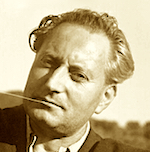
Jean Giono
1895 – 1970 CE
Jean Giono (1895 – 1970)
Son of a cobbler, one of France’s greatest writers, twice imprisoned pacifist, follower of Walt Whitman’s egalitarian pantheism, and grandfather to the modern ecological movement; Giono wrote numerous novels, short stories, articles, and poems. A master of metaphor, his masterpiece work The Man Who Planted Trees was rejected by Reader’s Digest for being too metaphoric. In response, Giorno refused any royalties, surrendered all his rights releasing it into the public domain, and gave free use to anyone who wanted to use it. Within 4 years it was translated into 12 languages and soon became a classic inspiration for everyone concerned with the environment and sustainability. An animated version won an Academy Award in 1988 and it’s considered one of the best animated films of all time.
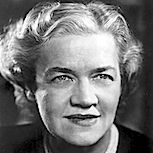
Margaret Chase Smith
1897 – 1995 CE
Called by Khrushchev "the devil in disguise of a woman,” Chase was the first woman to serve in both houses of the US Congress, as chair of the Senate Republican Conference, and the first to be placed in nomination for the presidency. Though an independent Republican, she deeply respected John Kennedy, voted against Nixon proposals, and led the opposition against demagogue Joe McCarthy. She strongly supported civil rights, Medicare, increased educational funding, and the NASA administrator said without here they wouldn’t have been able to land a man on the Moon.
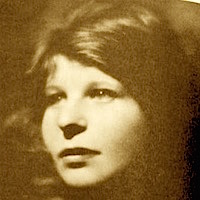
Ariel Durant (Chaya Kaufman)
1898 – 1981 CE
Brilliant conversationalist, champion of women’s rights, student, lover, wife, muse, and equal to Will Durant; Ariel emigrated with her mother to America from the Ukraine when 3 and grew up on the New York streets learning to fight and take care of herself. Will married her when she was 15 and he was 28 and her teacher. They spent the next 68 years together on an intellectual, contemplative, and literary journey writing The Story of Civilization and many other books and articles. Named "Woman of the Year,” she shared a Pulitzer Prize and the Presidential Medal of Freedom with her husband. Constantly introducing him to radical artists, poets, and free-spirits from Greenwich Village to Woodstock, she balanced Will’s pedantic, scholastic personality with love-of-life adventurism. Although running away several times during the early days of their marriage, they came to represent the depths of close relationship, the joining of the two halves of the complete being described by Plato, and the possibilities for marriage.
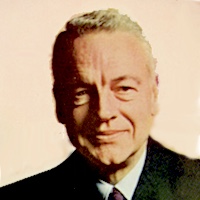
Robert Hutchins (Robert Maynard Hutchins)
1899 – 1977 CE
An educational philosopher whose time has arrived; Robert Maynard Hutchins was University of Chicago president, Yale Law School dean, Editor In Chief of the Great Books of the Western World, and a leading proponent of secular perennialism—nonspecialized and nonvocational
education based on discovering the “sense” rather than relying on just the words, on principles not just facts. Encouraging deeper understanding, prioritizing thinking for ourselves, and attacking superficial focus on entertainment and the narrow “trade school” approach to education; he eliminated varsity football at the University of Chicago and implemented novel educational programs based on the Great Books and Socratic dialogue. In later life he ran the Ford Foundation and channeled huge sums into programs for adult education, to train teachers, and to spread liberal arts. One of these became PBS.

Antoine de Saint-Exupéry
1900 – 1944 CE
French war hero, famous writer, poet, journalist, pioneering aviator, and an international inspiration for social aid and humanitarian projects; Antoine has the unique distinction of having his books banned by both Nazi occupied France as well as de Gaulle’s “Free” France. Modern France though voted The Little Prince the best book of the 20th century and holds him in such high esteem that his image and several of his drawings were printed on paper money, coins, and the stamps of more than 25 countries. Translated into more than 250 languages and full of deep but simple wisdom, The Little Prince is the 4th most-translated and one of the best selling books of all time.
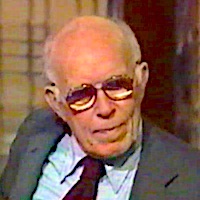
René Dubos
1901 – 1982 CE
Influential scientific environmentalist
Microbiologist, leading humanist and influential environmentalist; Dubos wrote 32 books including a Pulitzer Prize winner. Creator of the famous phrase, "Think Globally, Act Locally," he empowered and entrusted individuals, local, and small organizations making needed changes rather than relying only on large, impersonal, and out-of-touch institutions. He argued that only local, small-scale organizations can clearly see and respond to their "unique physical, climatic, and cultural contexts." He balanced this sentiment, however, with an emphasis on need for communication with a world order conscious of environmental priorities. While not ignoring our immense global challenges, he conveys an optimistic, positive, and realistic approach.
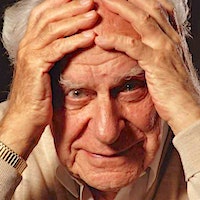
Karl Popper
1902 – 1994 CE
Major Philosopher of Science
Social commentator, philosopher, and academic; Popper grew up in an academic household. His parents were good friends of Freud's sister and his father was a true bibliophile with as many as 14,000 books in his personal library. During his student years, he became very interested and supportive of Marxism until police shot 8 of his unarmed friends. That led him to a life-long support of social liberalism and his creation of an evolved philosophy of science. One of his students—George Soros—became a philanthropic billionaire and now support a think-tank dedicated to Popper's influence. Rather than fixating on just one point of view, he worked to reconcile diverse ideas from socialism, libertarianism, social democracy, traditional liberalism and conservatism.
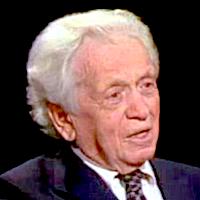
Max Lerner (Maxwell Alan)
1902 – 1992 CE
Journalist, professor, humanist, and controversial cultural commentator; Lerner supported Roosevelt’s New deal, fought against racial discrimination, and gained a high place on Nixon’s hate list. He mainly supported progressive causes but went along with the internment of Japanese Americans during World War II and backed Ronald Reagan. Untied to unthinking political dogma, he was considered a controversial liberal during the 50’s and 60’s but more conservative during the 80’s. A close friend of Elizabeth Taylor, he worked on antiwar efforts, taught at Harvard, Sarah Lawrence, Wellesley, Brandeis, and wrote for the New York Post, the New Republic, The Atlantic, Saturday Review, and many other publications. He applied his dedication to personal responsibility in a struggle with lymphatic cancer which he won and described in a book, Wrestling with the Angel.
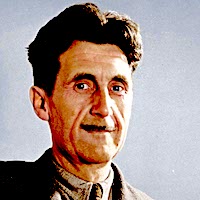
George Orwell
1903 – 1950 CE
English, poet, humanist, apostle of doubt, and powerful political influence
George Orwel, Eric Arthur Blair (1903–1950)
Novel-writing journalist, one of the best English essayists, ranked second on a list of "The 50 greatest British writers since 1945,” insightful literary critic, humanist, poet and powerful political influence; Orwell transformed a life filled with failure, poverty, and humiliation into literary genius and cultural influence. Originator of many words and phrases that have become part of popular culture—"Thought Police", "Big Brother", “Cold War,” "memory hole", "doublethink", “Orwellian,” and "thoughtcrime”—his writing exposed intellectual hypocrisy, social injustice, totalitarian and authoritarian influences, and turned his difficult experiences into great literature.
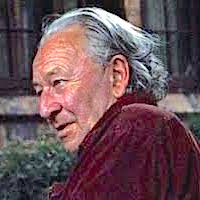
Gregory Bateson
1904 – 1980 CE
Poet-philosopher, deep thinker, anthropologist, and developer of a "meta-science;” Bateson established double-bind theory, helped apply systems theory to the social science, and was part of the core group that developed cybernetics. While married to Margaret Mead, he worked in South Pacific islands on anthropology and during World War II on black propaganda which led to a marriage-fatal disagreement with his wife on the use of science and technology in social planning. Describing 20th century history as a malfunctioning relationship based on betrayal and hate, he posed the development of cybernetics as a direction toward the creation of healthy relationships through the healing of paradox and the non-dual combination of thought and emotion.

Dietrich Bonhoeffer
1906 – 1945 CE
Theologian, prolific and influential author, anti-Nazi double-agent spy, martyr, and non-thought lineage holder; Bonhoeffer worked against Hitler and the Third Reich when almost everyone around him was either seduced, bullied or exterminated and his fellow pastors were preaching, "Christ has come to us through Adolph Hitler." Leaving a safe home in America; he helped smuggle Jews into the neutral Switzerland, vocally and secretly opposed the Nazis, and was tortured and killed in a concentration camp. A deeply religious Christian, he taught a “religionless Christianity” without a metaphysical God confused by concepts and belief.
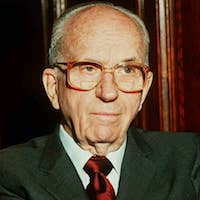
James Michener
1907 – 1997 CE
Historical and Generational Saga Master
Inspired storyteller of the human spirit, Michener created some of our most memorable fictional characters. Often writing for 12-15 hours a day for weeks and weeks, he created books that became best-sellers, movies, Broadway musicals, TV series, and a Pulitzer Prize winner. Because these books were so carefully researched, they became one of the more popular ways of learning about certain historical periods and peoples.
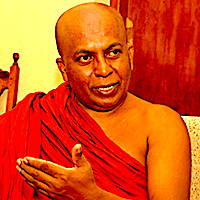
Walpola Rahula Thero
1907 – 1997 CE
“Supreme Master of Buddhist Scriptures”
History professor, Ph.D. in philosophy, active socialist, and first Buddhist monk to hold a chair in a western university; Walpola both brought a more clear conception of Buddhism to the Western world and practical kind of Western politics to Sri Lanka. Given the title, “Supreme Master of Buddhist Scriptures,” he wrote extensively and taught at many universities including UCLA, Swarthmore College, and Western University. He encouraged monks to not only study and practice Buddhism but also to get involved in the political process as a way to translate meditative awareness into a practical influence on society and culture.
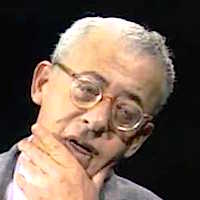
Saul Alinsky
1909 – 1972 CE
Saul Alinsky (1909 – 1972)
“Founder of modern community organizing,” “creator of a backyard revolution in cities across America,” champion of the poor and powerless; Alinsky became a strong influence on Cesar Chavez, Hillary Clinton, Barack Obama and Dolores Huerta but his methods and strategies were also studied and used by Tea Party organizers. Dedicating his own work to improving the living conditions in poor communities, he was active in the labor movement, poverty alleviation across the USA, in black ghettos, and California barrios. Reviled and banned by establishment politicians but admired and imitated by counterculture-era organizers; he was described by William F. Buckley Jr. as an “organizational genius,” by Adlai Stevenson as “a most faithfully reflect[ion] our ideals of brotherhood, tolerance, charity and dignity of the individual,” and according to Time magazine he “altered democracy.”

E. F. Schumacher
1911 – 1977 CE
The “People's Economist”
While working in Burma during the mid ‘50s, Schumacher developed a set of principles he called “buddhist economics” — emphasizing the idea that people need good work for proper human development. Traveling through many Third World countries, he helped governments create self-reliant economies based on local resources and needs. A pioneer and instigator in creating a philosophy of “appropriate technology,” and known as the “People's Economist,” his economic theory based on wisdom instead of only materialism, became one of the most serious alternatives to the dominant economic theories based on Adam Smith and John Maynard Keynes.
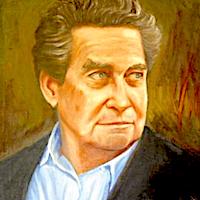
Octavio Paz
1914 – 1998 CE
Persuasive poet and convincing social commentator
Poet, diplomat, penetrating social commentator, one of the most important 20th century writers, and one of the greatest Hispanic poets; Octavio Paz dissolved his cultural prejudices and became a true world citizen. After traveling extensively in Asia, Europe, and the USA, he became Mexico’s ambassador to India. He criticized his countrymen as “instinctive nihilists who hide behind masks of solitude and ceremoniousness" and resigned from his Mexican diplomatic service when the government massacred students in 1968. Famous for his remarkable poetry that won a Nobel Prize for Literature, he balanced this kind of writing with influential political commentaries in popular magazines he founded.
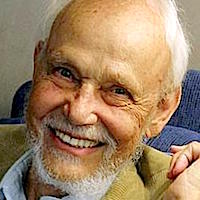
Huston Smith
1919 – 2016 CE
Born in Suzhou, Huston Smith lived there with his Christian missionary parents until 17 when he moved to the USA where he became not only a religious scholar but a practitioner of his Christian tradition as well as Vedanta, Sufism, and Zen Buddhism for more than 10 years each. A close student of Aldous Huxley, he became an integral part of the Harvard Project and the Center for Personality Research working with Timothy Leary and Ram Das. When the Supreme Court ruled against Native Americans using peyote as a religious sacrament, he took up the cause and helped pass the American Indian Religious Freedom Act amendment. In the 1950s, he helped Martin Luther King break the color barrier at a segregated University and later helped the Dalai Lama come to the USA for the first time. Lifelong advocate of religious synergy, social justice and peace; his work blended theology, mythology, and science.
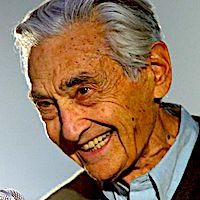
Howard Zinn
1922 – 2010 CE
Historian of the oppressed and defeated
Educational innovator, historian, author of 20+ books, and democratic socialist; Zinn grew up in a family of factory workers who couldn’t afford to buy books or magazines. In a dramatic and life-molding event, when young and participating in a peaceful political rally, he was knocked unconscious by mounted policing charging on the protestors. During the Vietnam War, he supported Vietnam Veterans against the War, the Civil Rights and Labor Movements. He backed the Native American, Black, and Women’s equality efforts, opposed the 2003 invasion of Iraq, and the extensive military bombing of civilian targets. Realizing the omni-influence of the phrase, “History is written by the victors,” he worked hard to popularize the stories of the morally superior but physically defeated historical groups. The success of these efforts could be measured by the identities and allegiances of his major critics: Republican Indiana Governor Mitch Daniels tried to keep his book out of state schools, because of his support for Martin Luther King, the FBI added him to their Security Index and label him a high security risk, and—even as recently as 2017—an Arkansas legislator tried to ban his books from public schools.

Noam Chomsky
1928 CE –
A Jew now banned from Israel but awarded World Peace awards for the promotion of human rights; vilified by corporate interests and the mainstream press but given honorary degrees from over 50 colleges and universities; arrested multiple times for his political activism but one of the single most cited scholars in academic circles; on Nixon's Enemies List and illegally watched by the CIA for many years but considered by progressives “a figure of enlightenment and inspiration;” called by the far right “a hard-boiled anti-American monomaniac” but a foundational pioneer in the fields of cognitive science, linguistic theory, computer science, and evolutionary psychology; Chomsky may be the most important intellectuals alive today.
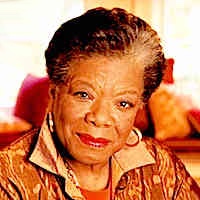
Maya Angelou
1928 – 2014 CE
From a background that included working as a nightclub dancer, fry cook and sex worker; Angelou climbed to becoming the first poet to recite for a Presidential inauguration since Robert Frost. She worked directly with Martin Luther King Jr., Malcolm X, and other Civil Rights leaders, received 50+ honorary degrees, dozens of literary awards, and the Presidential Medal of Freedom. An important spokesperson for women and black people, her books are both subject to bans in libraries as well as being extensively used in universities around the world. “America's most visible black woman autobiographer,” her books and poetry both defended and appreciated Black culture, became a powerful influence on modern hip-hop music, and helped further gender and racial understanding.
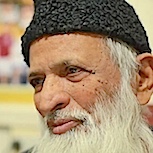
Abdul Sattar Edhi عبدالستار ایدھی
1928 – 2016 CE
Pakistan's "Father Teresa"
Called the “Father Teresa” of Pakistan, “Angel of Mercy,” and “the world's greatest living humanitarian;” Abdul Sattar Edhi was a philanthropist and social activist who dedicated his life to helping the poor. National hero and one of Pakistan’s most respected people, he established the world’s largest ambulance service and his country’s largest welfare organization that has trained 40,000+ nurses, rescued 20,000+ abandoned babies, operates orphanages, clinics, shelters, rehab centers for drug addicts and the mentally ill, and works in Africa, eastern Europe, the middle East and even the USA.
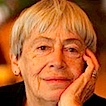
Ursula Le Guin
1929 – 2018 CE
At an early age, Le Guin saw her father making notes in an old book. In this way she discovered Lao Tzu who became a lifelong teacher and companion. Her father, a famous cultural anthropologist also exposed her to the native American shamanistic traditions. This led to a prolific and influential literary career with works translated into 31 languages and winning 21 Locus, 6 Nebula, 5 Hugo, a Newbery and World Fantasy, many “year's best” and other awards. Not just entertaining, these books challenged and positively shaped modern views on race, gender, society and the environment.
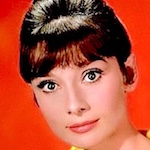
Audrey Hepburn
1929 – 1993 CE
She wasn’t that beautiful really, not sexy, an okay actress but not exceptional; what made Audrey Hepburn so popular was her deep goodness as a person. A wise and thoughtful humanitarian, she was active in the Dutch resistance during World War II, nominated for 7 Academy Awards, won twice and is one of only a few people who won Academy, Emmy, Grammy, and Tony Awards. She became the Goodwill Ambassador of UNICEF and devoted years working in some of the poorest communities of Africa, South America and Asia. Her movies continue to uplift, inspire, and improve the lives of millions of people.
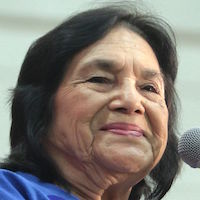
Dolores Huerta
1930 CE –
Champion for workers', immigrants', and women's rights; labor leader and civil rights activist; co-founder of an organization that became the United Farm Workers (UFW); Huerta was the first Latina inducted into the Women's Hall of Fame and received both the Eleanor Roosevelt Award for Human Rights and the Presidential Medal of Freedom. In 1988 her severe beating (necessitating spleen removal in emergency surgery) by police during a peaceful protest was caught on videotape and resulted in change SFPD crowd control policies and a huge settlement that she used to benefit farm workers.A frequent subject for murals, ballads, and the names of schools; she was on stage with Robert Kennedy just before his assassination, in 2008 formally placed Hillary Clinton's name into nomination, and was honorary co-chair of the 2017 Women's March on Washington. Though almost 90, she continues to work through her foundation on health, environment, education, and economic development. (picture at age 86)
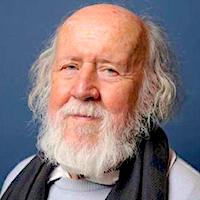
Hubert Reeves
1932 CE –
Prolific science popularizer, professor, NASA advisor, and successful Director of Research; Reeves continues to lead a long and productive life dedicated to avoiding scientific pitfalls and encouraging a sane and wise approach to scientific development. A good example of how science can blend and merge with spiritual understanding—like Aldous Huxley's more philosophical concluding realization—Reeves summarizes his scientific understanding with the recognition that the most important priority in life is to be kind and help people.
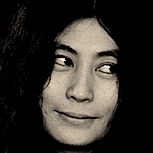
Yoko Ono 小野 洋子 (“Ocean Child”)
1933 CE –
The daughter of one of Japan’s richest banking clans in a long lineage of samurai warrior scholars; Yoko One fell from attending exclusive schools in New York and Japan to begging for food with all the family possessions in a wheelbarrow. A true, faithful life-artist, she collaborated with John Lennon’s public protests against the Viet Nam war, co-wrote ”Give Peace a Chance” inspired many famous songs, and was the only woman to sing a lead vocal on a Beatles’ recording. Continuing her life as “the world's most famous unknown artist,” she’s extended John Lennon’s legacy of political and social activism, philanthropy, and influence on world culture.
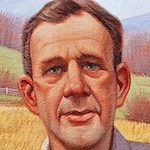
Wendell Berry
1934 CE –
Defender of small-farm values and sustainable agriculture, champion of appropriate technology and environmental causes, cultural conscience and effective critic of industrial farming, environmental degradation, and materialistic lifestyle; Berry’s prolific writing beginning with articles in the early 70’s for Rodale Press, Organic Gardening, and The New Farm and continuing through more than 50 books has inspired new generations willing to put place over ambition, sustainability over wealth, family and friends over fame, making the world a better place over power and prestige.
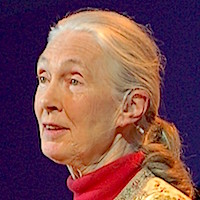
Jane Goodall
1934 CE –
Adventurer, environmental activist, scientist, pioneering primatologist, and wise gardener; Jane Goodall became UN Messenger of Peace, the world's best expert on chimpanzees, founder of the Roots & Shoots program, and an important influence on young people to choose helping the world over selling out to lucrative careers that plunder the planet. Criticized for changing the chimpanzee social group dynamics, she became an example of McLuhan’s dictum that “every new technology requires a new war” because it disrupts the status quo social order. In this case, the disruption went beyond the chimpanzee social order and also disrupted the human-to-animal and human-to-plant hierarchies. As Stevie Nicks describes her in the song Jane, “There are angels here on earth.”
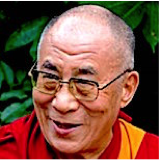
Dalai Lama XIV Tenzin Gyatso
1935 CE –
Born to a remote small farming family on a straw mat in a cowshed, the Dalai Lama became the world’s most popular political leader. He received the Nobel Peace Prize, the highest US honor of Congressional Gold Medal, the Freedom Medal, and is one of only 6 people given Honorary Citizenship by the Canadian government. Traveling the world for decades, he became the most famous voice for the environment, women's rights, non-violence, fair economics, and interfaith dialogue as well as the world’s main influence for the preservation of Tibetan culture. Promoting a Buddhist approach to science, economics, and politics; he has traveled to more than 67 countries and written more than 110 books.
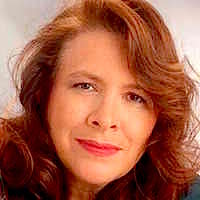
Jean Houston
1937 CE –
Visionary thinker, philosopher, scholar, historian, and author of 26 books; Jean Houston was trained by Teilhard de Chardin, Eleanor Roosevelt, as well as her father who was Bob Hope’s main comedy writer for 35 years, She’s an active consultant to leaders of 25 countries, worked with the United Nations and UNICEF in more than 100 countries, and helped Hillary Clinton write her book, It Takes a Village. She participated in LSD research before it became illegal and is considered one of the main founders of the Human Potential movement. Her friend and mentor Margaret Mead lived with her the last few years before she died and another lifelong friend, Buckminster Fuller said her “mind should be considered a national treasure.”
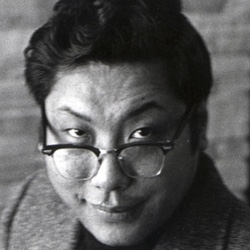
Chögyam Trungpa
1939 – 1987 CE
A once-in-a-generation kind of teacher, a mahasiddha for our times, a transducer transforming ancient wisdom into modern idiom. Per Allen Ginsberg, “A Renaissance man of the highest peaks of East, meditation emperor, space awareness Dance-master, witty rude calligrapher whose poetry and flower arrangements unite the Mind with Body… Prime Minister of Imagination… Chairman of the Board of Directors of Ordinary Mind.” Meditation master, scholar, teacher, poet, artist, he was honored as a mahasiddha by teachers like Khyentse Rinpoche and the 16th Karmapa. “The father of Tibetan Buddhism in the US,” his influence was and remains beyond words.
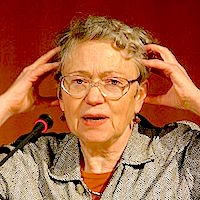
Mary Catherine Bateson
1939 CE –
“ Dr. Spock’s first baby,” daughter of Margaret Mead and Gregory Bateson, and after having “the best-documented childhood in the United States,” Mary carried on her parents’ intellectual and anthropological tradition writing and teachings in places like Harvard, George Mason University, and Amherst as well as leading organizations like the Institute for Intercultural Studies in New York. When a freshman in college after attending one of her mother’s lectures with a boyfriend, she lamented the possibility of ever having a good marriage after her mother and father’s example; she agreed to an engagement and wound up married to that same boyfriend for over 50 years.

John Lennon
1940 – 1980 CE
Poet of our age, 20th Century social conscience, inscrutable, uncompromising, brave and outrageous; John Lennon personifies the Lao Tzu lineage and left a lasting and profound impact on the international evolution of consciousness. Uncompromising psychological prophet, he distilled and magnified both our dark side shadows and bright, golden age potentials. Reviled by the Nixon administration and investigated by the FBI, he’s now number 8 on the list of 100 Greatest Britons. Anthem writer for the counterculture and the anti-war movement, reviled by the Nixon administration and investigated by the FBI, he’s now number 8 on the list of 100 Greatest Britons.

Bob Dylan
1941 CE –
Though thought of in many different ways by different people, at heart, Bob Dylan may most essentially represent a modern-day Taoist sage, a continuation of Lao Tzu’s lineage. Awarded the Nobel Prize for Literature in 2016 and called the “Shakespeare of his generation,” he wrote over 500 songs recorded by more than 2000 singers and sold tens of millions of albums. Though world famous for decades and beyond “successful” in numerous ways, his humility and refusal to make a big deal out of himself remains. His music and message transcends his voice and culture. As relevant today as it was in the 60’s, it continues as a major influence on our cultural conscience and consciousness. And this influence shows all signs of continuing far into the future.
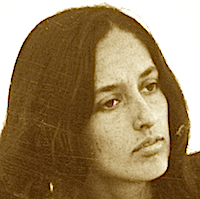
Joan Baez
1941 CE –
Famous but down-to-earth, proud but self-deprecating, a powerful speaker of truth to power; Joan Baez helped launch the civil rights and anti-war movements, social justice on multiple fronts including nonviolence, the environment, and human rights in general. A leader of the dynamic, counterculture social and political change of the sixties, she influenced the direction of American politics and world culture. For 60+ years, recording 30+ albums and songs in 8+ languages; her message of peace, compassion, and justice spread throughout the world both through her own direct example and through her relationship-with impact on people like Bob Dylan, David Harris, and Steve Jobs.
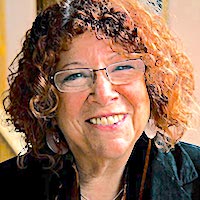
Meg Wheatley
1944 CE –
Bringing ancient wisdom into the modern world.
Global citizen, author, and management consultant who brought contemplation, systems thinking, chaos theory, and a natural science approach into the business world; Wheatley has had a powerful influence over organizations from schools to churches, from non-profits to governments, from major corporation to small, developing country start-ups. Working on every inhabited continent, more than 40 countries, and with every type of organization; she’s helped and inspired fruitful changes creating better organizations, societies, and work-place interactions. A student of Pema Chödrön and Namkhai Norbu, she’s one of the most interesting examples of bringing ancient wisdom into the modern world.

Paulo Lugari
1944 CE –
Paulo Lugari (1944 - )
Regenerator of a rain forest in a rain-leached, desiccated area without trees, creator of a village (Gaviotas) in a nearly uninhabited area later called by the United Nations “a model of sustainable development,” and known as“the inventor of the world;” Paulo Lugari represents one of the most inspiring stories of human goodness and potential. In 1971 his group of idealistic, challenge-seeking engineers and visionaries moved to a desolate, semi-populated region of Colombia, SA. Today, that once barren land has regenerated a rain forest with millions of trees, sprouted 247 plant species, and established an aquifer that supplies water to over 45,000 people. One of the most hopeful environmental success stories ever told, Gaviotans successfully built a prototype of sustainability in an area ravaged by political terror. Every family has free housing, community meals, and schooling. There are no weapons, no police, no jail or rules, yet they are an oasis of peace.
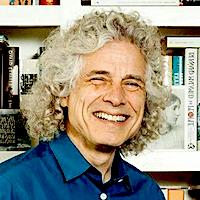
Steven Pinker
1954 CE –
Humanistic scientist, insightful cultural commentaror
Harvard professor, linguist, cognitive/evolutionary psychologist, humanist, and insightful cultural commentator; Pinker is considered “one of the world's most influential intellectuals.” Translating the significance of new scientific and psychological discoveries into common language, his many books help make these contemporary insights useful in everyday life. Emphasizing the psychology of cooperation and communication, he became a Two-time finalist for the Pulitzer Prize and Humanist of the Year in 2006. His current book, Enlightenment Now helps transmute pessimistic, nihilistic, and negative views into an energized and inspired optimism in relation to both our social and individual states of mind.
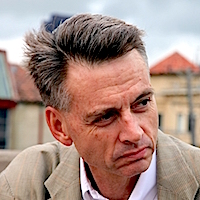
Robert Wright
1957 CE –
Radical centrist, army brat, popular professor, science editor, journalist and prize-winning author; Wright has applied his journalistic skills to translating and interpreting complicated scientific and religious principles. With understanding and insight, his books and articles disentangle the convoluted juxtrapositions interconnecting religion, philosophy, psychology, politics, and science. His decoding of the perspectives of evolutionary psychology and applying them to everyday life offers a valuable key to finding a sane way in these rapidly changing times.
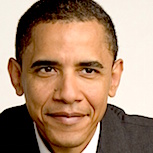
Barack Obama
1961 CE –
Winner of honors ranging from the Grammy Awards to the Nobel Peace Prize; Obama is the first African American US President, the first sitting president to visit Hiroshima, and first to address the African Union. In spite of single-minded and almost exclusive focus on opposing him by House and Senate Republicans, his accomplishments rival almost any American president. Beginning with one of the most dire financial crises in US history; he turned the economy around, greatly improved foreign relations, passed the Affordable Care Act, killed Osama bin Laden, reigned in Wall Street, restored relations with Cuba and made progress on fighting climate change, prejudice, workplace abuse, and gun control.

Michelle Obama
1964 CE –
An inspiring icon for black women, women and men of all races; Michelle Obama exemplifies quiet courage, dignity, and the deep “Te” described in the Tao Te Ching. Descendant of slaves, daughter of the working class, sister of American educational opportunities, and wife to good government; her influence on American culture is subtle but profound and goes far beyond her focus on poverty alleviation, LGBT rights, promoting good nutrition and healthy life style. Fashion icon on the cover of Vogue magazine and first First Lady to announce the winner of an Oscar; she also advocated for military families. Touring the world, she repaired and uplifted America’s image probably more than anyone since Benjamin Franklin.
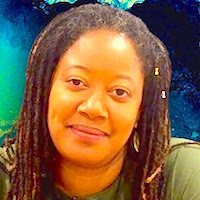
N. K. Jemisin
1972 CE –
Award winning speculative fiction writer, bimonthly column writer for The New York Times, fearless blogger, psychologist, and first black writer to win a Best Novel Hugo award; Jemisin helps mythologize current event themes in her fiction and carries these messages into the political and social worlds. Though arguably a stretch to include her in our Women of Wisdom Lineage, she’s still young and obviously on the way in that direction. Pointing out that 10% of the SFWA (Science Fiction and Fantasy Writers of America) members voted for alt-right writer Theodore Beale (Vox Day), she called him "a self-described misogynist, racist, anti-Semite, and a few other flavors of asshole” which led to him calling her an “ignorant savage" and his expulsion from the SFWA.
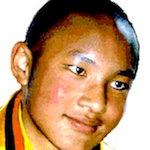
Karmapa XVII ཨོ་རྒྱན་འཕྲིན་ལས་རྡོ་རྗ (Orgyen Thrinlay Dorje)
1985 CE –
Born in a remote part of Tibet to nomadic parents, when he was seven years old, Tai Situpa and the Dalai Lama recognized Ogyen Trinley as the 17th Karmapa. The Chinese government agreed and planned to train him to take over for the Dalai Lama. When he was 14 though, he secretly climbed out a window and escaped to India. Mired in political challenges, he focused his teachings on a practical compassion that protects the environment, saves animals, and engages in sustainable development projects teaching that planting trees is more beneficial than many religious practices.)
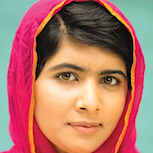
Malala Yousafzai ملالہ یوسفزئی
1997 CE –
Malala Yousafzai ملالہ یوسفزئی (1997 - )
Pakistani activist, the youngest Nobel Prize laureate at 17, "the most famous teenager in the world,” and listed by Time magazine 3 times as one of the world’s most influential people; Malala grew up in a the Swat Valley where the girls were banned from schools. Working hard for the education of women around the world, she was shot by a Taliban assassin in 2012 but thena group of 50 leading Muslim clerics issued a fatwa against the people who tried to kill her. Her book was banned by a 152,000-member Pakistan School Federation and though she is still broadly criticized in Pakistan for being too pro-Western; she didn’t hesitate when meeting with President Barack Obama and his family to challenge the use of drone strikes.
Related Sources (1 sources)
The Great Conversation by Robert Hutchins
Quotes about the Humanism Lineage (11 quotes)
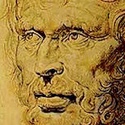
“It must not be supposed that innate vices can be completely eradicated by education; but, the lingering traces of inborn temperament that cannot be eliminated by philosophy are so slight that there is nothing to prevent men from leading a life worthy of the gods.”
Comments: Click to comment

“As India is par excellence the land of metaphysics and religion, China is by like preeminence the home of humanistic, or non-theological philosophy.”
Comments: Click to comment

“The humanists captivated the mind of Italy, turned it from religion to philosophy, from heaven to earth, and revealed to an astonished generation the riches of pagan thought and art.”
Comments: Click to comment
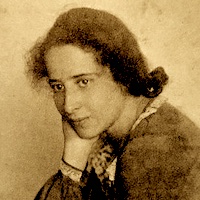
“We humanize what is going on in the world and in ourselves only by speaking of it, and in the course of speaking of it we learn to be human.”
Comments: Click to comment

“I am a humanist because I think humanity can, with constant moral guidance, create reasonably decent societies. I think that young people who want to understand the world can profit from the works of Plato and Socrates, the behavior of the three Thomases, Aquinas, More and Jefferson — the austere analyses of Immanuel Kant and the political leadership of Abraham Lincoln and Franklin Roosevelt.”
Comments: Click to comment

“My religion is humanitarianism, which is the basis of every religion in the world.”
Comments: Click to comment
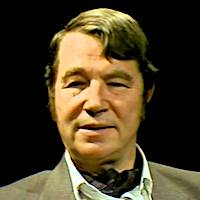
“Humanism is only another name for spiritual laziness, or a vague half-creed adopted by men of science and logicians whose heads are too occupied with the world of mathematics and physics to worry about religious categories.”
Comments: Click to comment
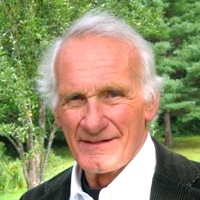
“The most elemental difference between the machine and the garden is that one is driven by a force which must be introduced from without, the other grown by an energy which originates from within itself... A machine must be designed, constructed, and fueled.”
Comments: Click to comment
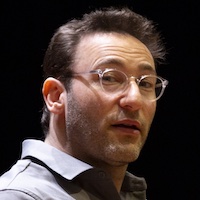
“When a leader embraces their responsibility to care for people instead of caring for numbers, then people will follow, solve problems and see to it that that leader's vision come to life”
Comments: Click to comment
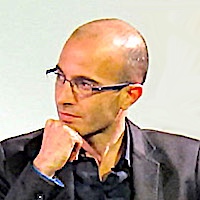
“In ethics, the humanist motto is 'if it feels good, do it'. In politics, humanism instructs us that 'the voter knows best'. In aesthetics, humanism says that 'beauty is in the eye of the beholder'... What, then, will happen once we realize that customers and voters never make free choices, and once we have the technology to calculate, design or outsmart their feelings?”
Comments: Click to comment
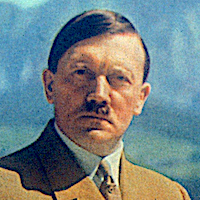
Comments (1)